#also the fact that despite being 19 and an adult and should have the ability to have my own free will i feel like i need parental permission
Text
Making a pros and cons list to try and help me decide if I should try to get taylor swift tickets but it's not helping because none of the cons feel like they hold the same weight as the "it's taylor swift??" pro bullet point, despite all of the cons being about all the extra costs this would involve (plane, hotel, travel, food, outfit etc)
#also the fact that despite being 19 and an adult and should have the ability to have my own free will i feel like i need parental permission#i also just spent 700 dollars on a new laptop#and i need to buy a new bed + mattress 😥#and i need to save money for my third year field trip in two years (fingers crossed ill get to go to south africa)#i need a job man centrelink isnt paying enough#what young adult can actually have a life when they get less than $400 a fortnight
0 notes
Text
On this day 10 years ago (at age 16) I got in a big fight with my dad’s household about how I wasn’t growing up fast enough and I needed to figure out my future already. As an adult, I can’t help but think about what a disservice this was to me. A 16 year old is still a kid. I wasn’t out there doing drugs or spending lots of money or partying or getting knocked up, in fact I was getting better grades at the time than I had been getting the year prior, finally had friends, and had joined a couple of school clubs. I was finally drawing things that weren’t depressing again, I was visibly improving my health, and I was even helping out with the family business. But none of it was good enough because I hadn’t been applying to any colleges and wasn’t seeking part-time work and didn’t feel a need to do more chores than the adults in the house (Why should I do dishes if Adult 2 won’t even get off his ass to put his dishes in the sink? Why should I clean the litterboxes for cats I didn’t ask for if nobody is going to teach me and Adult 3 only does it once a week?).
What this pressure did, what this fight did, was not to help me along the path to adulthood, but instead pushed me further into the depression I was supposed to be improving from, and became one of the echos I heard in my head when I struggled (especially after having to quit college twice). What it did was make me feel I couldn’t ask them for help on those necessary tasks (how do I apply to a college? how do I write a resume? what is a cover letter?) because I had, in their eyes, already failed them anyway. What it did was convince me to return to anorexic/restrictive eating behavior because I clearly wasn’t earning my food, and I only ate when I was being observed because I knew not eating would be seen as another reason to get mad at me. What it did was make me feel this way constantly for years until they kicked me out at 19.
Now at 26, I still haven’t finished college, like I said I quit, twice. But I didn’t fall into debt, and despite my many mistakes along the way, I am now living with my fiancee, and I have a job that allows me to pay our bills while she goes part-time and focuses on her wellness and her art.
That household still seems to think that providing a roof and some food makes them saints, even though the cost of those things was torture, degradation, and being made to feel like an unwelcome burden as a child in my own father’s home, and being insulted for not taking it with a smile. That household still tries to make it out like I was the villain because I didn’t praise them every day and spent much of my time in my room when I was home, and said room wasn’t cleaner than the rest of their house.
But I’m free of them, and I won’t be inviting any but my father from that household to my wedding.
Oh and did I mention 19 is also when I got diagnosed with fibromyalgia and depression and when I told the doctor how long it’d taken to find that diagnosis she was pissed off? Because I started experiencing fibromyalgia symptoms at 15/16ish and had CLEARLY had depression issues from the ALARMINGLY low age of 6? Imagine hearing that about someone in your care and instead of apologizing for never being mindful of their symptoms, you kick them out for not getting a job outside of their abilities fast enough while they’re also trying to go through community college.
2 notes
·
View notes
Text
Part III (1/2): chapters 19-25
Vs. Mahito Arc
Chapter 19 (aka why this blog exists)
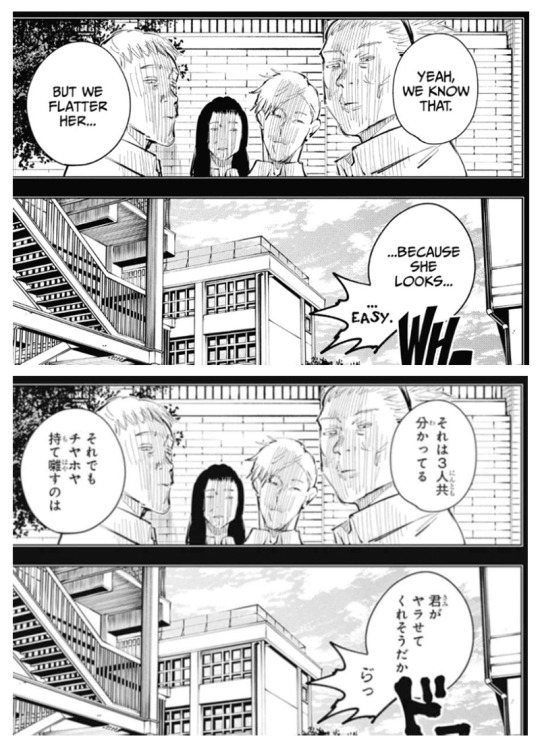
J:”Yeah, we know that. But we flatter her because she looks easy.”
⇒ ”And the three of them know it as well. But they flatter you exaggeratedly anyway because they think you’ll let them do you”
Actually Junpei’s lines.
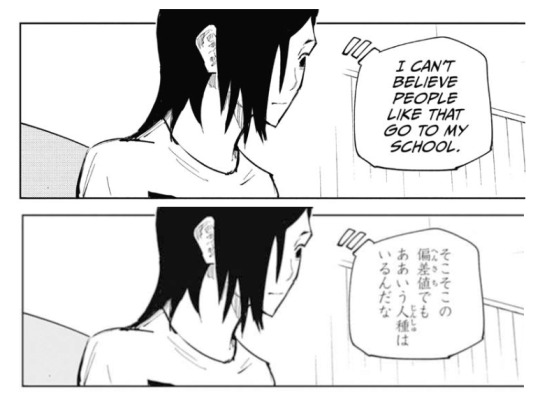
J:”I can’t believe people like that go to my school.”
Not incorrect, I just want to point out that Junpei didn’t just say “people”, the word he used is “race” (人種), which implies he doesn’t see them as the same kind of human he is.
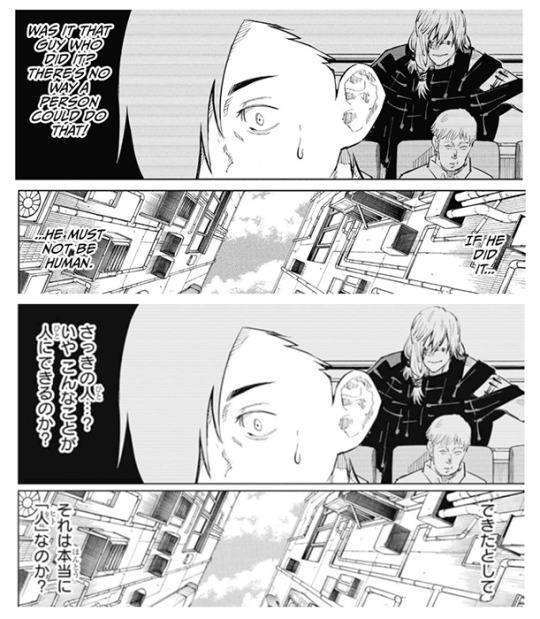
J:”Was it that guy who did it? There’s no way a person could do that! If he did it, he must not be human.”
⇒ “Was it that person just now? No, would such a thing be even possible for a human being? And if it was, would they really be a ‘human being’?”
Overall correct but the flow was different. Mind you, 人 can be translated both as “person” and “human being” (among others) depending on the context. Imo this captures the nuance better but YMMV!
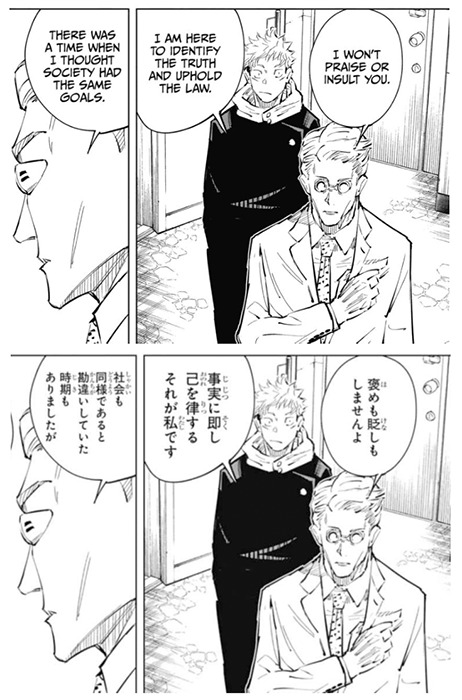
N:”I’m here to identify the truth and uphold the law. There was a time when I thought the society had the same goals”
⇒ ”Adapting to the facts [in front of you] and managing yourself accordingly. That’s who I am. There was a time where I mistakenly believed society operated on the same basis.”
This was really hard to translate, especially since the phrase Nanami uses here is rather formal language. I actually checked the official anime subtitles for this one and they went with “I adhere to the facts and judge on that basis”, which I guess is close enough? I’d probably go with it as well if not for the fact that he doesn’t just say 律する but 己を律する (己/onore = I/me in humble language).
Seems like the exact meaning of the phrase is difficult to understand even for Japanese people - there are whole articles out there breaking down the meaning and giving examples of how to implement it in life 8D Anyway, the simplest explanation is “to control yourself”, with further nuance of “enforcing rules on yourself in order to achieve a goal”, “restricting your desires and impulses by your own will” etc.
Thanks a lot, Gege.
Btw, Ino, who respects Nanami greatly and considers him a mentor, actually uses the same phrase, word for word, in ch. 95! (事実に即し、己を律する) That’s how important it is. Also, continuity!

Y:”Let’s do it!”
N:”There’s no need to get excited”
⇒ Y:“Let’s go all out!!”
N:”No, if moderate’s enough, let’s just do it moderately”
They both used descriptors for just what kind of intensity they should approach the mission with. Imo, an important distinction because after they learn the full extent of the situation, Nanami takes back his words from this moment and agrees with Yuuji, going as far as to use the same words Yuuji did here.
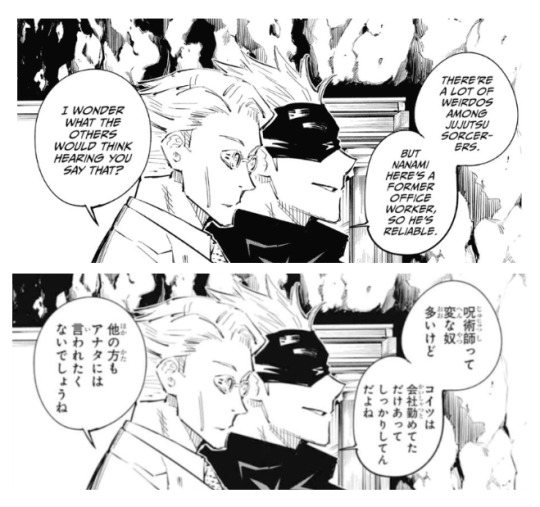
N:”I wonder what others would think hearing you say that”
⇒ “I’m sure the others wouldn’t want to hear that from you [of all people]”
So not so much “don’t be rude” as “dude, you’re the weirdest of them all”. Emphasis mine.
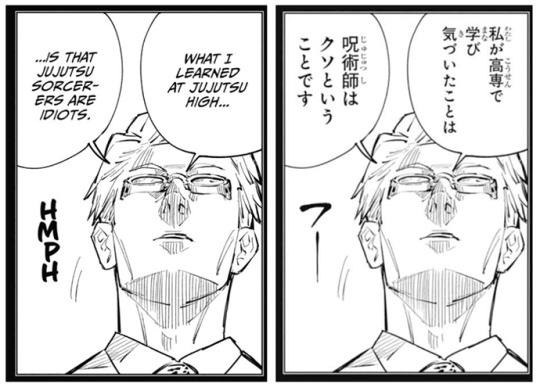
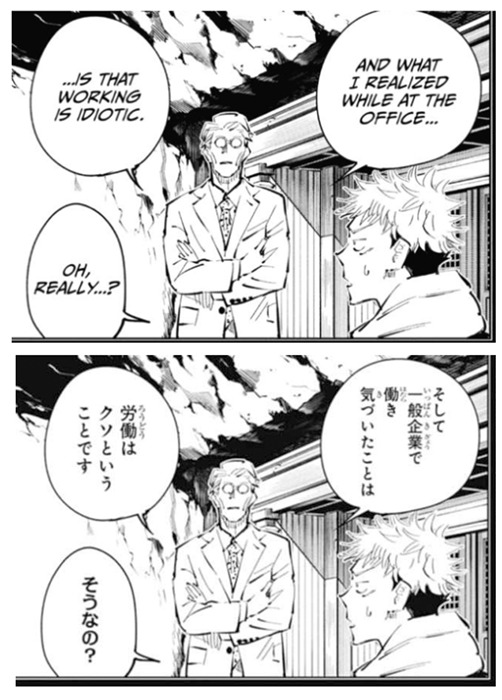
N:”What I learned at Jujutsu High is that jujutsu sorcerers are idiots”
& “What I realized while at the office is that work is idiotic”
He actually says “shit” both times lol. If it was just the humour that suffered here, it still wouldn’t be too awful but unfortunately it’s not just that. The “sorcerers are shit” line gets recalled when Nanami’s facing death, trapped in Mahito’s domain, which makes it pretty damn important. It gets translated yet differently by the official release then, too, which further damages continuity I believe Gege intended for this.

”So I took the lesser of two evils. Nothing more, nothing less”
⇒ “If both are shit, then I just chose the one I’m more cut out for. That’s all as far as the reason for my coming back is concerned.”
I mean, if we realllllly insist on watering down everything that Nanami says (as JJK translators apparently did), then the basic meaning was conveyed but the original wording and nuance was closer to what I proposed.

N:”Prove to me that you can be useful in spite of the demon Sukuna inside of you”
⇒ “Give your best to prove that you’re useful despite carrying the bomb that Sukuna is.”
Considering how 2 pages later Nanami tells Yuuji that he’s not the one Yuuji should be proving himself to, it’d have been weird if this is actually what he’d said, wouldn’t it. But Nanami’s nothing if not reasonable, so that wasn’t the case.
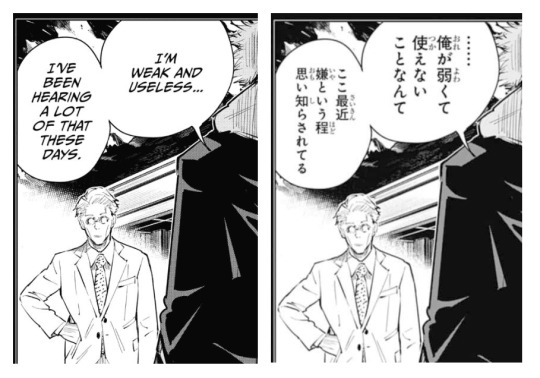
Y:”I’m weak and useless. I’ve been hearing a lot of that these days”
⇒ “That I’m weak and useless... I’ve been realising that to a painful extent these days”
“I’ve been hearing it” would imply that someone was actually saying it either to Yuuji himself or to others which he was aware of. (I mean, other than Sukuna.) The original wording doesn’t really hold such connotation.
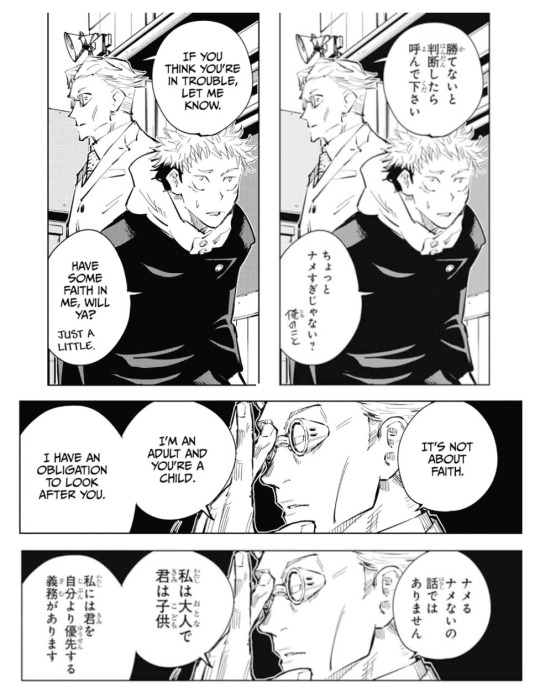
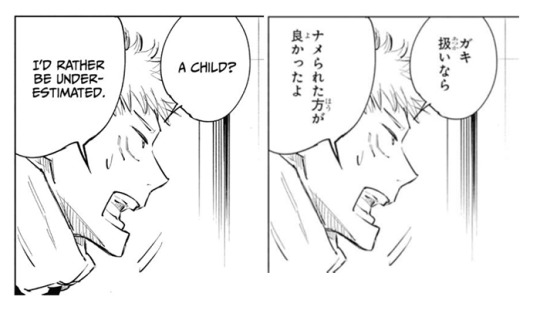
N:”If you think you’re in trouble, let me know”
Y:”Have some faith in me, will ya? Just a little.”
N:”It’s not about faith.(...)”
Y:”A child? I’d rather be underestimated”.
⇒ N:“If you decide you cannot win, please call me.”
Y:”Aren’t you underestimating me too much?”
N:”This is not about ‘underestimating’ or ‘not underestimating’.(...)
Y:”[Even] being underestimated would’ve been better over being treated like a kid.”
I guess the translators wanted to avoid saying “underestimate” 3 times in a row? Albeit that’s what the original does.
More importantly though!!
N:”I’m an adult and you’re a child. I have the obligation to look after you”
⇒ “(...) It’s my obligation to prioritise you over myself.”
Quite a different nuance, right. Not just “I have to look after you” but “your well-being [life] takes priority over my own”.
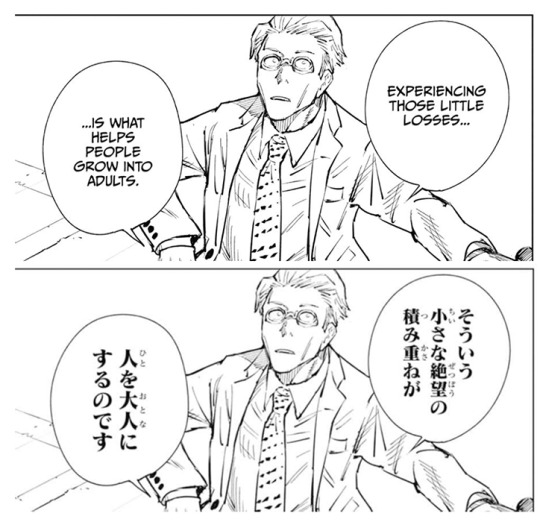
N:”Experiencing these little losses is what helps people grow into adults”
⇒ “It’s the accumulation of such small despairs that turns people into adults”
Not that wildly different but despairs (hopelessnesses) >>> losses, y/y. Also “helps” made it sound more positive when it’s both a poignant and at the same time dry statement.
Chapter 20
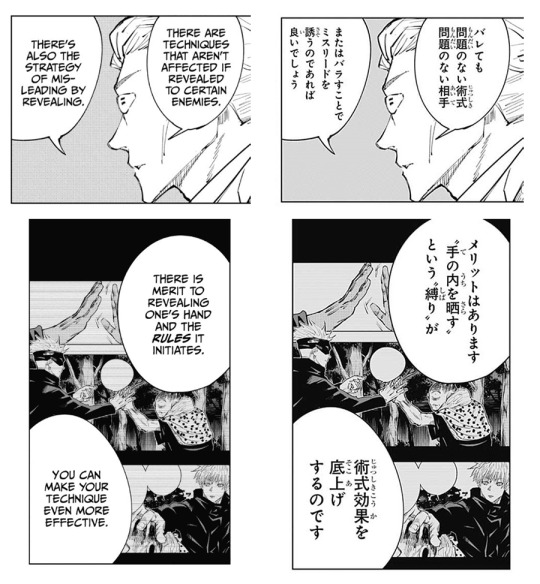
N:”There are techniques that aren’t affected if revealed to certain enemies”
Those two feel more like separate examples to me. I.e. that there are techniques that aren’t affected if revealed, and there are some enemies that you can afford to reveal your technique to. Could apply simultaneously but don’t necessarily have to, if that makes sense?
“There is a merit to revealing one’s hand and the rules it initiates. You can make your technique even more effective.”
⇒ “It has its merits too. The ‘binding’ of ‘revealing one’s hand’ amplifies the effectiveness of your technique.”
Wild lost “binding” appears! Like I indicated before, it’s the lack of consistency to translating terms that are consistent in the original, that has negatively affected the fans’ ability to understand the basics of jjk techniques and world-building.
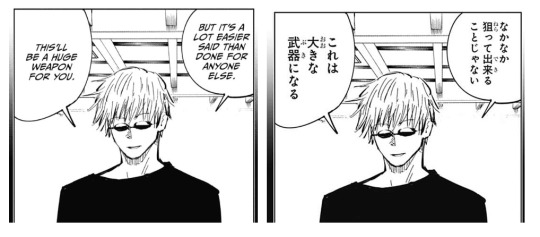
[Explaining Yuuji’s divergent fist]
GJ:”But it’s a lot easier said than done for anyone else.”
⇒ “It’s not something that can be easily done on purpose”

N:”His physical strength is superhuman. The impact of his hit doesn’t have incredibly strong energy, but it’s still about 20% more than a normal sorcerer. That means his delayed hit comes from his main source of cursed energy. It must be quite annoying for those on the receiving end. Such potential. If he’s able to go out all and combine his full physical strength with a cursed technique…”
⇒ “(...) The initial impact contains little cursed energy but it still achieves 120% of an average sorcerer. And then the actual cursed energy hits with a delay. For those on the receiving end it must be more unpleasant than one could imagine. And he’s got potential for growth, too. If he becomes able to add 100% of cursed energy to a 100% body…”
Uhh, this was a tricky one because on the first read it doesn’t seem that terribly wrong but when you read the original carefully, you realise this and that got lost in translation. My version should be closer to the original meaning.
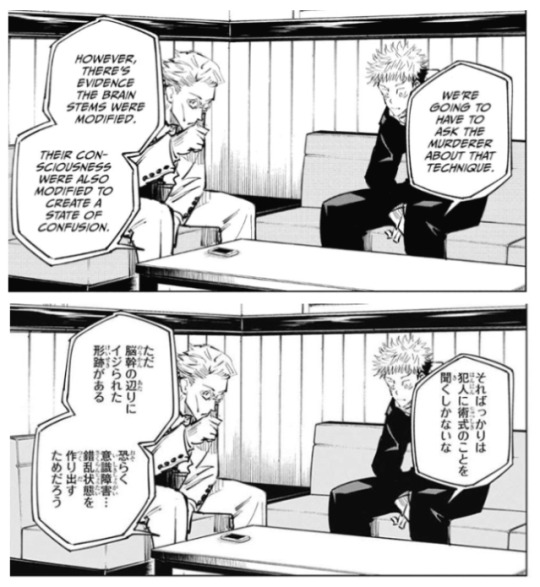
I:”We’re going to have to ask the murderer about the technique”
⇒ “That’s just something that you can’t know unless you ask the offender about their technique”
Obviously Ieiri wasn’t suggesting to literally ask the murderer.
“However there’s evidence the brain stems were modified. Their consciousness were also modified to create a state of confusion”
⇒ (...) This was probably done to create a disturbance of consciousness... a state of mental confusion”
Slightly different nuance for this one.
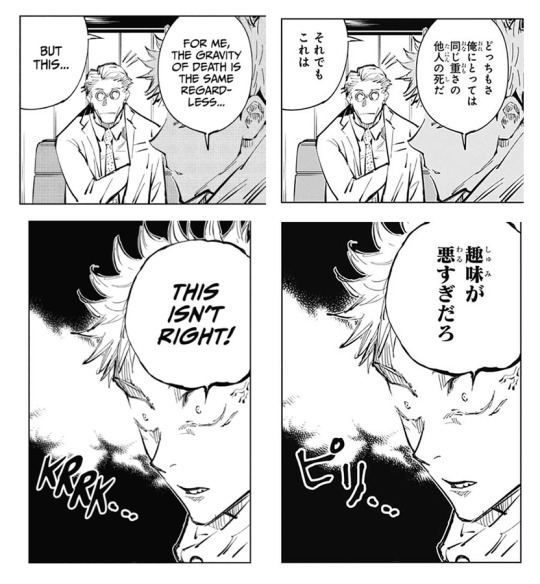
Y:”For me, the gravity of death is the same regardless. This isn’t right!”
First sentence is mostly correct but it should’ve been “the gravity of death of another person” (emphasis mine).
Second sentence sounds too mild for what is actually Yuuji being super mad specifically about the way those people were killed? The phrase he uses means something like "This is just in way too poor taste”, “way too vulgar” etc. I guess if you went for a less literal translation, you could say “just too disgusting”/”revolting”.
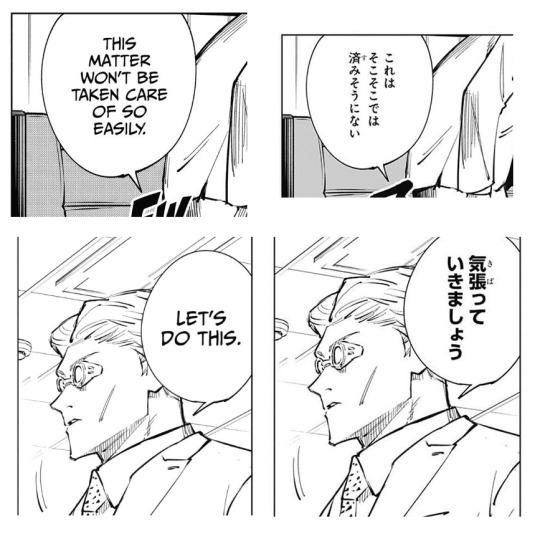
N:”This matter won’t be taken care of so easily. Let’s do it”
⇒ “Looks like ‘moderately’ won’t be enough here. Let’s go all out.”
This is the instance of Nanami retracting his words and backing Yuuji up by borrowing his own words that I mentioned earlier!
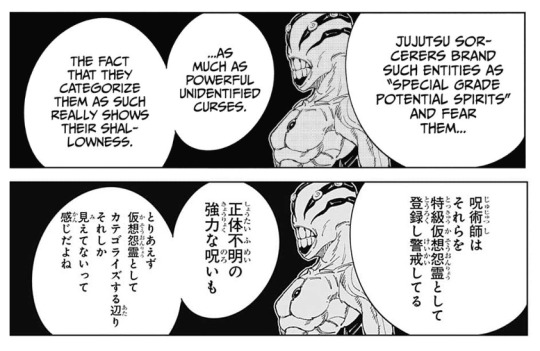
M:”Jujutsu sorcerers brand such entities as “special grade potential spirits” and fear them as much as powerful curses. The fact that they categorize them as such really shows their shallowness”
⇒ “Jujutsu sorcerers register them as “special grade potential apparitions” and remain on alert against them [on alert for their appearance]. The same applies to powerful unidentified curses. That they categorise them as ‘potential apparitions’ just shows how little they truly see.”
It’s not that sorcerers fear them per se but that they (most likely) monitor them and are on guard against them. When followed up by the “what people truly genuinely fear are natural disasters [forces of nature]” conversation, it becomes clear that what Mahito scorns sorcerers for is their short-sightedness for thinking all powerful curses must be born out of people’s imagination, ~urban legends~ etc.

[Junpei asking what Mahito was born from]
M:”Thanks to the hatred spewed between people I was born”
⇒ “I’m a curse born out of the fear and hatred people harbour towards [other] people"
or even
“I’m a curse born out of people hating and fearing people”
Again a quite different nuance. They really shouldn’t have edited “fear” out.
Chapter 21
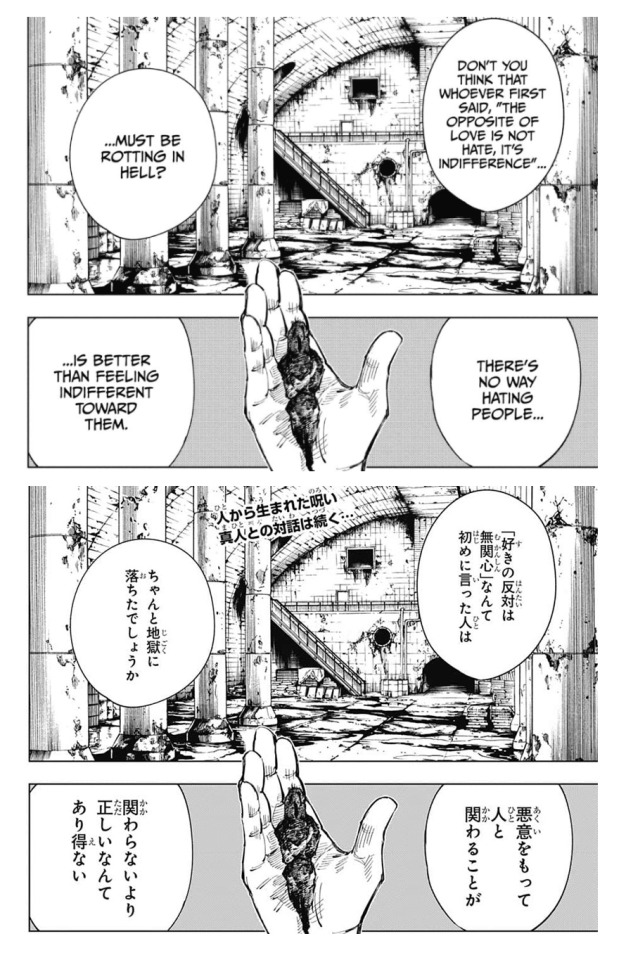
J:’Don’t you think that whoever first said, ‘The opposite of love is not hate, it’s indifference’ must be rotting in hell? There’s no way hating people is better than feeling indifferent towards them.”
⇒ “(...) There’s no way that approaching others with evil intentions is better than not interacting [with them] at all”
The first sentence is mostly fine although the original doesn’t include the “is not hate” bit, it only says “the opposite of love is indifference”. The second part is quite different. After all, hating doesn’t necessarily imply there’s any action taken.
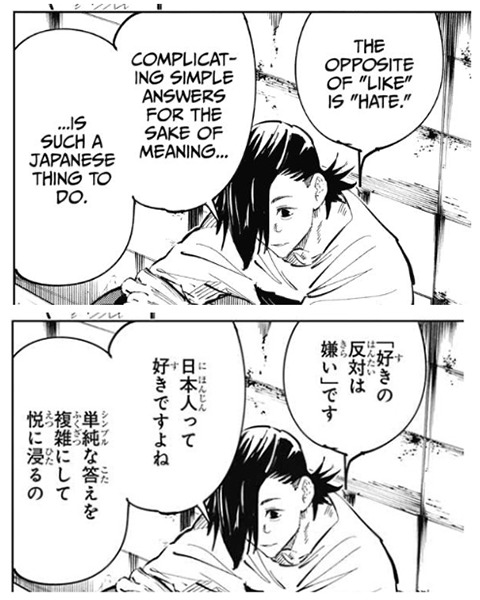
“Complicating simple things for the sake of meaning is such a Japanese thing to do”
⇒ “Japanese sure love it - complicating simple answers and gloating in it”
I didn’t like the “for the sake of meaning” bit, imo it’s over-interpreting.
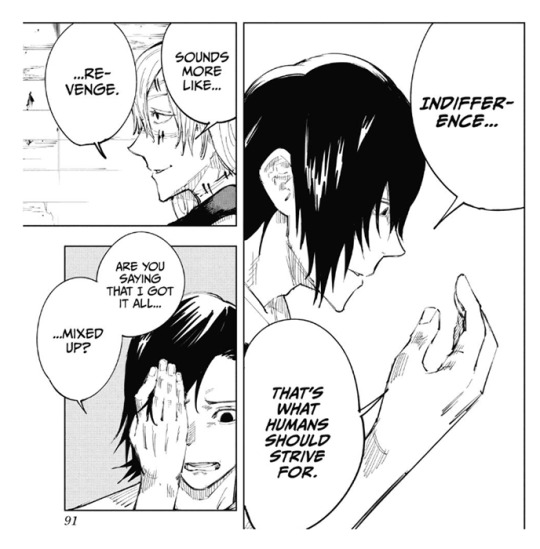

J:”Indifference. That’s what humans should strive for.”
M:”Sounds more like revenge”
J:“Are you saying that I got it all mixed up?”
Junpei’s first line here is fine although interestingly enough he puts it as “a virtue humans should strive for”. Then it’s
⇒ M:“And yet you wish for revenge”
J:”Are you trying to say I’m contradicting myself?”
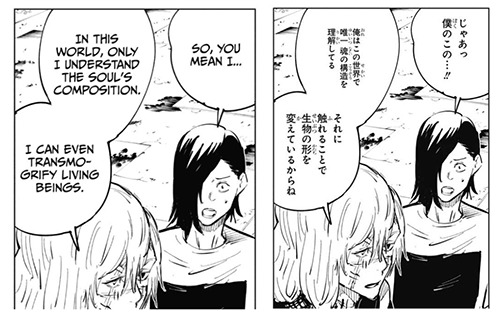
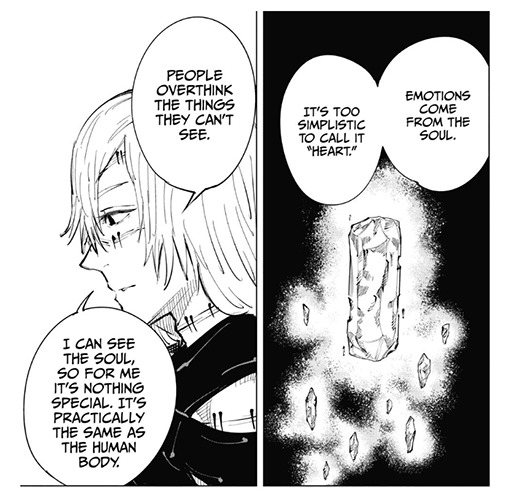
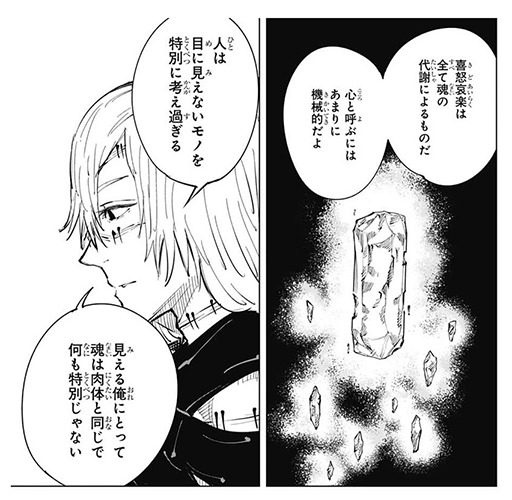
M:”In this world, only I understand the soul’s composition. I can even transmogrify living beings. Emotions come from the soul. It’s too simplistic to call it ‘heart’. People overthink the things they can’t see. (...)”
⇒ “In this world I’m the only one who understands the soul’s composition. After all, I change the shape of living beings by touching it. Emotions are products of the metabolism of the soul. It’s altogether too mechanical [of a process] to call it a heart. People assign too much value to things invisible to the eye.(...)”
Last one is literally “consider ‘special’ way too much”, simpler wording than what I went with but I tried to make it more legible.
The “metabolism of the soul” phrase is especially vital because Junpei throws it at Yuuji almost word for word when confronted by him at the school after his mother’s death.
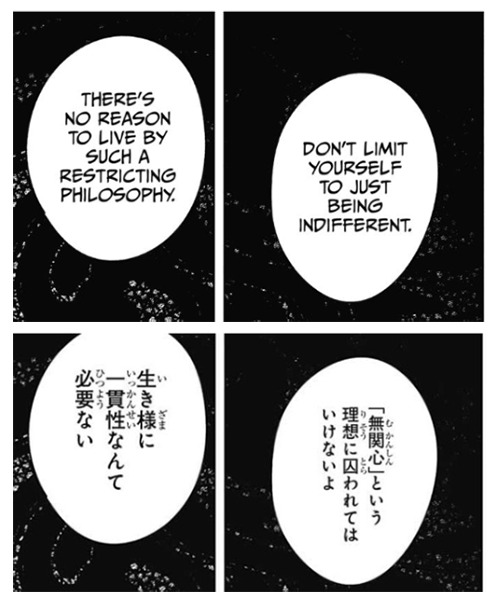
More philosophy lessons from Mahito-sensei \o/
“Don’t limit yourself to just being indifferent. There’s no reason to live by such a restricting philosophy.”
⇒ “Don’t allow yourself to be shackled by the ideal called ‘indifference’. There’s no need for there to be consistency in one’s way of life.”
Mahito actually takes the “is ‘consistency’ necessary” stance a few times in the manga, including when he and Getou squabble about the relationship between the body and the soul in Shibuya. A pity about the mistranslation here.

“I support everything you represent, Junpei”
⇒ “I’ll affirm your everything, Junpei”
Imo the act of supporting and the act of affirming while similar aren’t one and the same, hence the change.
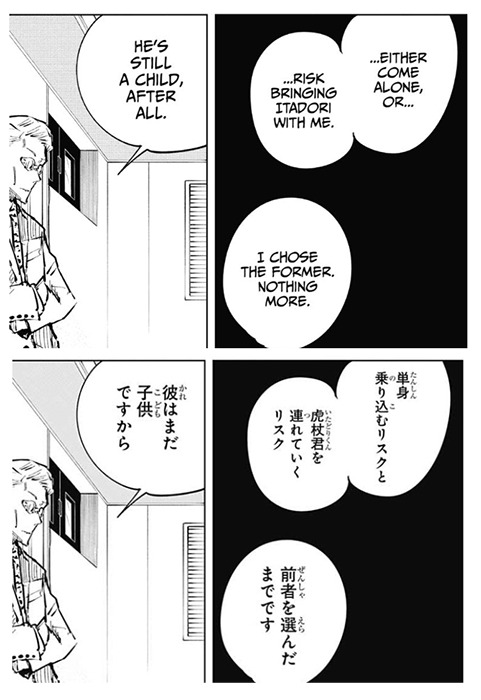
N:”Either come alone, or risk bringing Itadori with me. I chose the former, nothing more. He’s still a child, after all.”
⇒ “The risk of venturing [into the enemy’s territory] alone, or the risk of bringing Itadori-kun with me. I simply chose the former. He’s still a child, after all.”
Idk, I feel like cutting out “the risk” from the first option makes Nanami sound more callous? Like Yuuji’s a liability and going by himself is a sounder option. Whereas, it was actually him weighing two risks against each other and deciding that potentially endangering Yuuji is the one he can afford less.
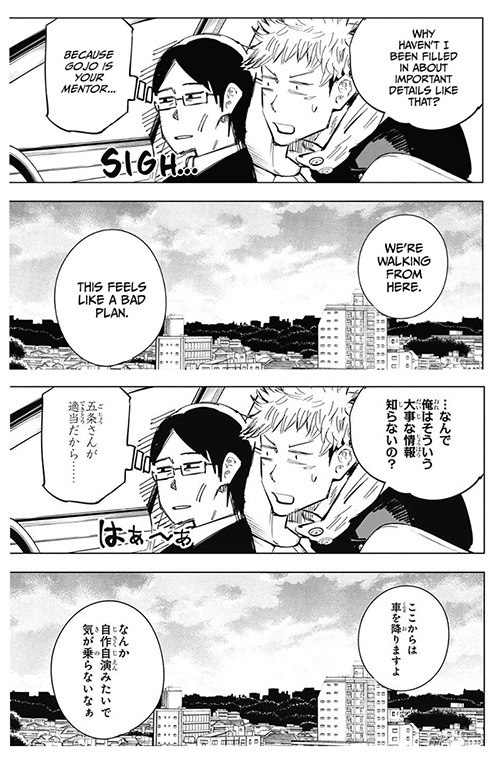
[After Yuuji asks why he doesn’t know important jujutsu related stuff.]
I:”Because Gojou’s your mentor.” ⇒ “it’s because Gojou’s ...”
He actually uses a lovely adjective to describe Gojou, which can mean a plethora of things, including: irresponsible, sloppy, lazy, unreliable, careless, perfunctory etc. etc.
Ichiji? Not a member of Gojou Satoru Fanclub.
Y:”This feels like a bad plan”
⇒ “This feels so staged, I don’t like it.”
Lit. “play [perform, read] one's own work”. I think what Yuuji might’ve meant here was that the plan felt dishonest? Second sentence could also be “I don’t feel up for it.”
Chapter 22
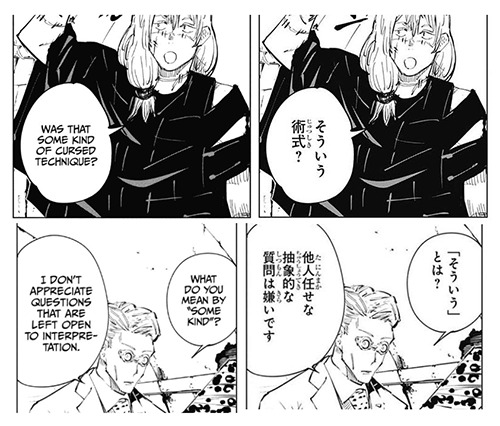
M:”Was that some kind of cursed technique?”
N:”What do you mean by ‘some kind’? I don’t appreciate questions that are left open to interpretation”
⇒ “(...) I hate abstract questions that put the whole burden on the other person”
Lit. “that leave it to others”. Other than Nanami being more straightforward with “hate”/”dislike”, I think this was him expressing he doesn’t like people who don’t even try to think for themselves and immediately demand answers from others instead.
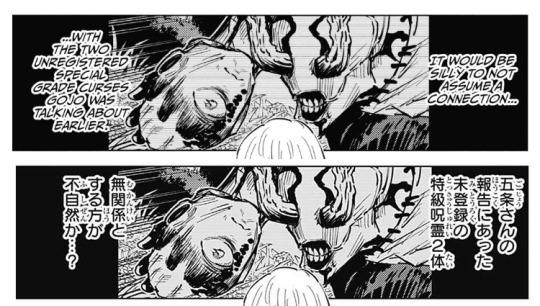
“It would be silly to not assume a connection(...)”
⇒ “It would be more unnatural not to assume a connection(...)”
Different wording (unnatural instead of silly), which imo affects Nanami’s characterisation.
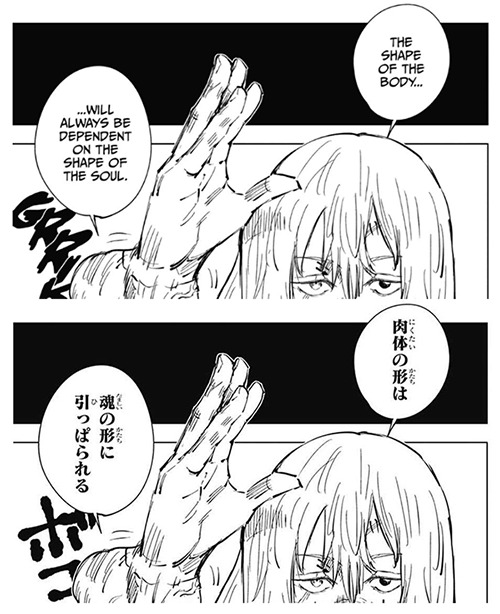
M:”The shape of the body will always be dependent on the shape of the soul”
This sounds a bit too passive and generic? Closer to “The shape of the body gets pulled along by the shape of the soul”, which is literally what Mahito’s technique does.

I’m heavily paraphrasing but!
magazine raw scans: ”it's 6:30 PM now and I started working at 11 AM, so I'm going to finish by 7PM no matter what”
official English release:”it's 5:30 PM now and I started at 10, gotta finish by 6”
The time change is so random, I wonder if Gege simply changed it themselves for the volume release. Maybe to bring it closer to the common office job times? Typical Japanese work day at the office begins at 9AM and lasts 8h + 1h break (completely unpaid but compulsory). I guess if Nanami skipped the break then working 10AM-6PM would make it exactly 8h?
The biggest mystery of jjk.
Chapter 23
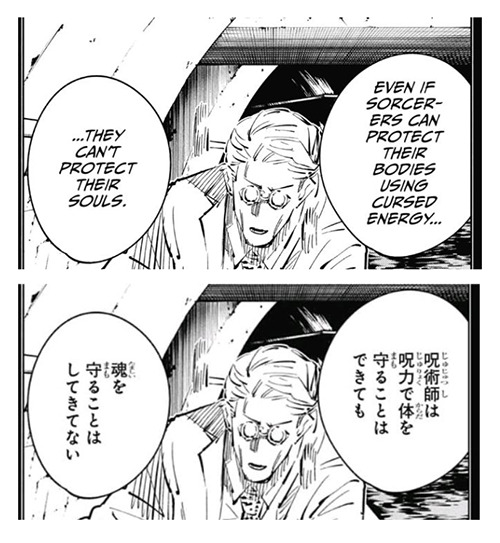
M:”Even if sorcerers can protect their bodies using cursed energy, they can’t protect their souls”
⇒ “Even if sorcerers can protect their bodies using cursed energy, they [just] aren’t used to protecting their souls”.
So it’s not that they “can’t” as in “are incapable of” and more that there’s never been the need, so they never learned how and aren’t used to doing it. As proven by Yuuji later it’s not impossible.
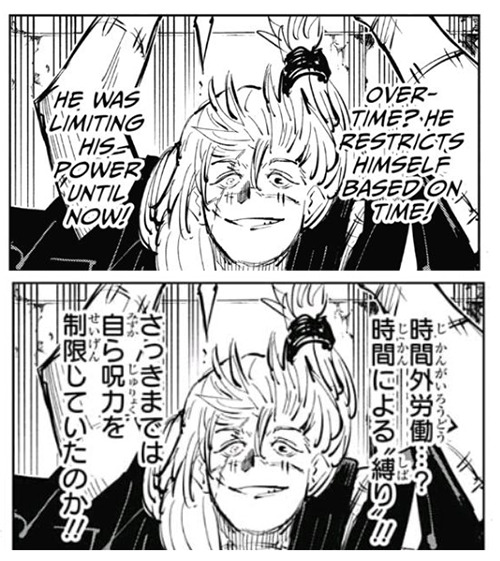
M:”Overtime? He restricts himself based on time! He was limiting his power until now!”
⇒ “Overtime work? A ‘biding’ based on time! He was suppressing his power by himself until now!”
Another instance where “binding” as a term makes its appearance (it even uses quotation marks) but wasn’t properly denoted by the translators.
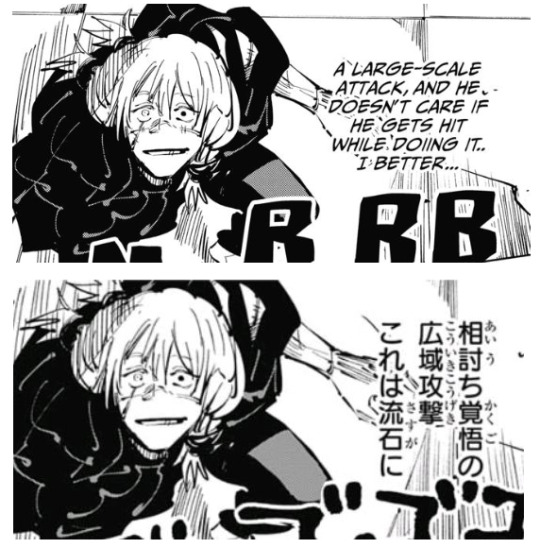
M:”A large-scale attack, and he doesn’t care if he gets hit while doing it!”
⇒ “A large-scale attack [done] with the resolve of [potentially] getting killed along with me!”.
The phrase Mahito uses here is 相打ち, lit. “killing [hitting] each other at the same time”. Also, “doesn’t care” and “is prepared/has the resolve” are quite different, aren’t they.
Chapter 24
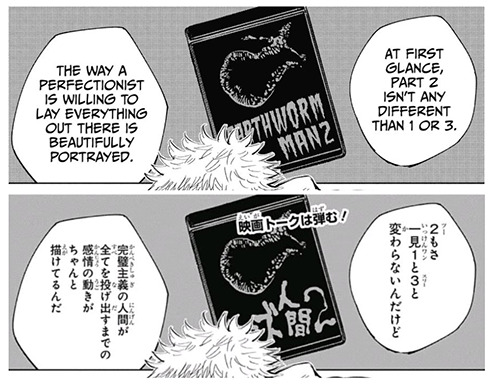
J:”The way a perfectionist is willing to lay everything out there is beautifully portrayed”
⇒ ”The change in emotions [leading up] to a perfectionist abandoning everything is properly portrayed here”
I’m including this because knowing Gege, it’s not just simple movie talk, and it’s actually foreshadowing Yuuji’s future fate or something 8D
I can’t decide if it’s “abandon” (also “throw out of the window”) or “sacrifice” because the word used can mean either. I’m leaving that to everyone’s interpretation.
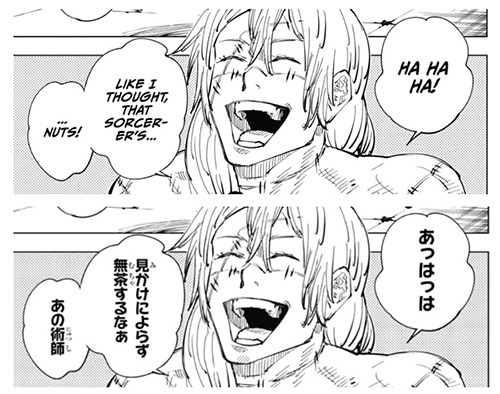
“Like I thought, that sorcerer’s nuts!”
⇒ “He doesn’t look it but he sure does reckless things, that sorcerer”
How does "he doesn't look it but (...)" even become "like I thought (...)"? He was laughing at and enjoying the contrast between Nanami's appearance/attitude and his actions/fighting.
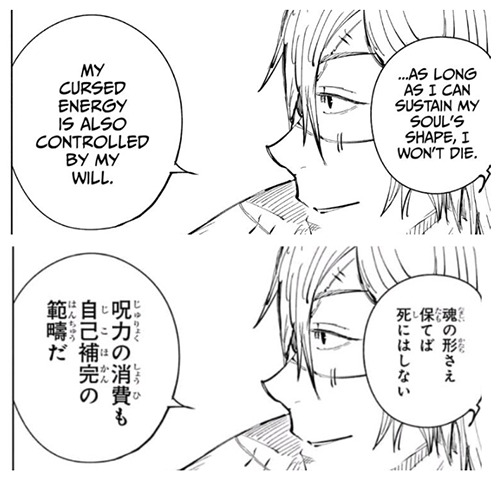
M:”My cursed energy is also controlled by my will”
⇒ “The spending of cursed energy too is among things I can supply by myself.”
I’m not entirely sure because it’s a tricky one, so take this one with a grain of salt. But the official release is definitely missing “spending/expenditure” and Mahito isn’t talking about using/manipulating his cursed energy in general but “the amount of cursed energy spent”.
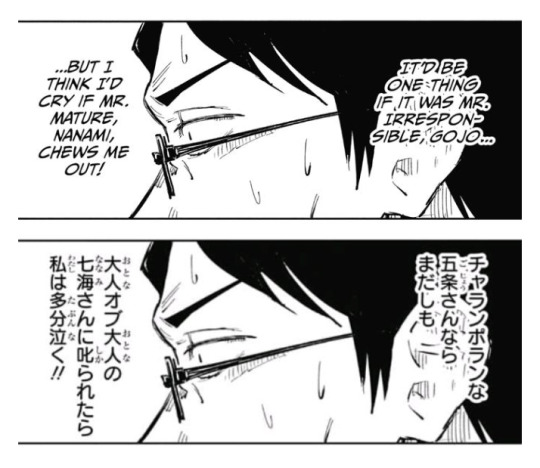
“Mr. Irresponsible Gojou” ⇒ “Devil-may-care Gojou-san”
“Mr. Mature Nanami�� ⇒ “The adult of [all] adults Nanami-san”/”the adult above all adults”
I just really enjoy Ichiji and his little epithets, I guess.
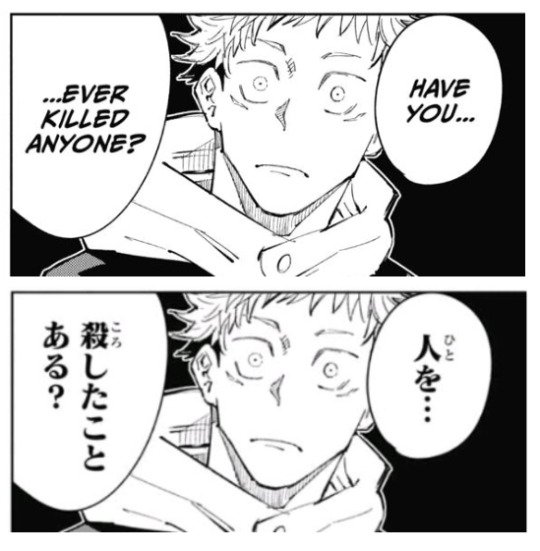
J:”Have you ever killed anyone?”
⇒ “Have you ever killed a human being/another human?”
Just putting it out there because imo there's a distinction between “anyone” and “a human being”. Especially considering how much of this arc was questioning what being a human means.
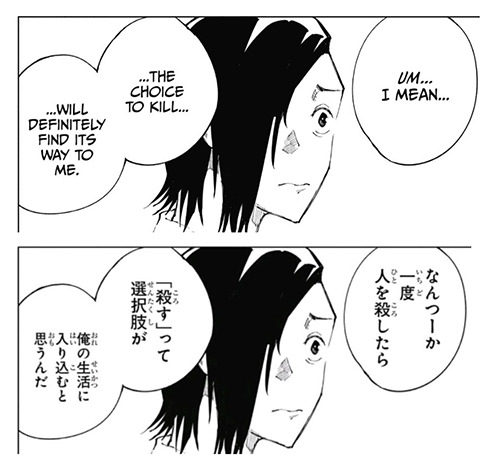
Y:”Um… I mean, the choice to kill will definitely find its way to me”
⇒ "How to put it... once I've killed someone, "killing" would become one of the possible options [to take] in my life".
Maybe the nuance was there in the official release too and I just didn't pick up on it but to me the former makes it sound more like he’s saying "I may still have to kill one day". Whereas the original seems to hold the connotation that if you do something once - even if it’s something as horrible as killing another human being - it becomes easier to do it again in the future because it's a choice you've made before, it's not untouchable anymore.
Chapter 25
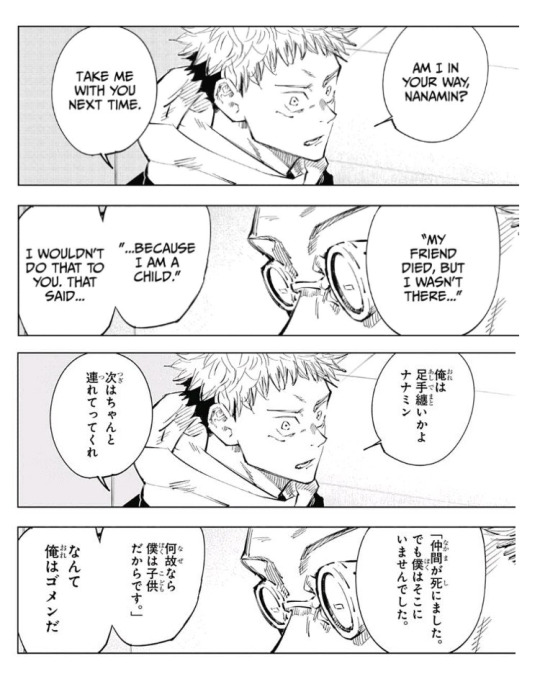
[Yuuji expressing his regret over Nanami choosing to go fight Mahito alone.]
"Am I in your way, Nanamin?”
⇒ “Am I a burden [to you], Nanamin?”
A different nuance for this line.
“’My friend died but I wasn’t there because I’m a child.’ I wouldn't do that to you. That said"
⇒ "’My comrade died. But I wasn’t there. Why? Because I am a child.’ I would hate something like that" [to be put in such a position]
And this is just pure mistranslation. The whole “my comrade died but I wasn’t there because I’m a child” line is actually Yuuji painting a possible scenario (he does it with short sentences but the speech is overall polite). What they translated as “that said” was actually a follow-up to that scenario and could be translated as “something like that”.
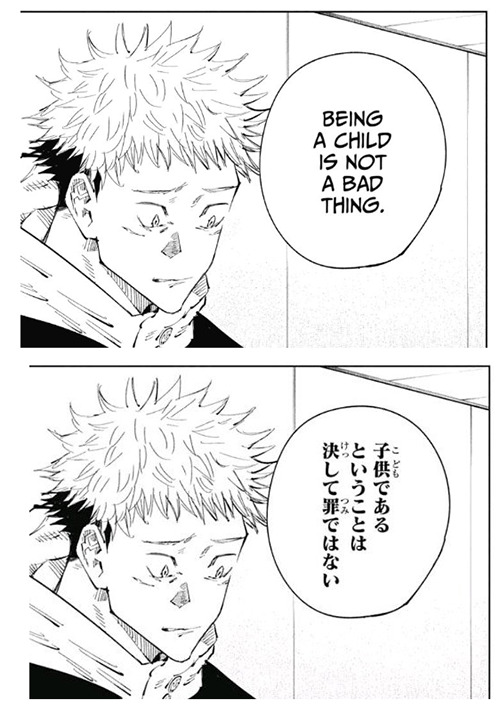
N:”Being a child is not a bad thing”
⇒ “Being a child is in no way a crime”
I wanted to point this out since the original word’s most common meaning is actually “sin”, which is significantly heavier than just “not a bad thing”. Could also go with a milder “is not something to feel guilty about” here I guess.
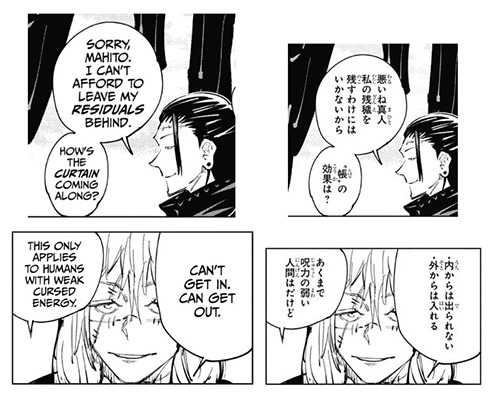
G:”How’s the curtain coming along?”
M:”Can’t get in, can get out. This only applies to humans with weak cursed energy.”
⇒ G:”What’s the effect of the ‘curtain’?”
M:“Can't get out from the inside, can get in from the outside. (...)”
Literally the opposite for the curtain’s effect. Emphasis is Gege’s, too! Also Getou’s question was actually about how exactly the curtain in question would work, and not just how it was coming along.
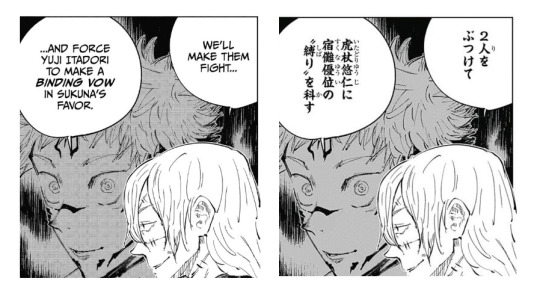
M:”We’ll make them fight and force Yuji Itadori to make a binding vow in Sukuna’s favor”
Just to reiterate, whenever “binding vow” appears, it’s actually just “binding”.
[to part iii (2/2)]
[to part iii (2/2)]
101 notes
·
View notes
Link
How to be resilient: This practical guide to dealing with setbacks is essential reading
Ensure you're making practical self-care steps to avoid becoming overwhelmed by the 'new normal'.
Life might be getting back to normal but many of us are still feeling the effect of the pandemic on our mental health. In fact, you might not even realise the full impact the past year has had on your mental health until you're back in 'the real world'. Indeed, recent ONS figures show cases of depression are on the rise despite lockdown lifting. From the period of 27th January to 7th March 2021, around 1 in 5 (21%) adults in the UK experienced some form of depression, an increase since November 2020 (when the figure stood at 19%) and more than double that observed before the Coronavirus pandemic (10%).
That's why it's so important to take heed of your own mental health and ensure you're making practical self-care steps to avoid becoming overwhelmed by the 'new normal'.
"Mental health is a huge part of all of our lives and for too many of us it’s a mystery, but if we understand our minds we can put ourselves in control so we can really live," says Daniel Howell, a mental health activist and author of You Will Get Through This Night.
Inspired by Dan’s own mental health journey shared with millions of his fans on stage and screen, along with his work as an ambassador for mental health charity Young Minds, his new book promises to be a practical guide to understanding and taking control of your mental health, written in an entertaining and personal way from someone who has been through it all.
Written in consultation with psychologist Dr. Heather Bolton and spilt over three sections; This Night, Tomorrow and The Day After, the book provides a refreshing, realistic approach to looking after your mental wellbeing the way we all experience it - whether you are in a crisis, just looking to make a change or want to know how to look after yourself every day.
One key aspect of his book is how to be resilient and deal with setbacks, which we are adamant will prove extremely useful for anyone struggling as we come out of lockdown....
"We all know that life can throw a curveball when we least expect it, so it’s important to know how to cope with these surprises, and not let them throw you off your positive momentum.
Life is a rollercoaster, or more like the graph shape of a llama rolling down a hill and climbing up again. We can’t predict the chaos. Despite our best efforts and intentions, it’s normal to have ups and downs. Remember that mental health is not a straight line, we can do what we can to raise the floor level, but it will always wave with the happenings of the world.
It doesn’t have to be a sudden shocking event, such as a… lightning strike! (sorry?) Life is naturally full of moments of change that we need to be able to handle. Breakups, moving, changing jobs – things that are very common can throw us off our track and we should all know how to keep ourselves on the rails.
Resilience
Training your resilience can help you to keep going in the face of adversity. It’s more than just bouncing back, it’s the act of moving forward as we grow from our experiences. Being resilient can look like:
Viewing challenges as opportunities
Focusing on the things you can control
Adapting your response to challenging situations
Maintaining a sense of purpose and drive
Asking for support when needed
Training your resilience can help you to keep going in the face of adversity.
Resilience is about being realistically optimistic. It’s not wishful thinking, it’s just being aware of what you can actually achieve and allowing yourself to be hopeful that you will succeed. Don’t be cynical about your own abilities, planting a seed of doubt that can self-sabotage. If you second guess yourself, it could be a self- fulfilling prophecy. Be realistic, but be fair to yourself and go into situations wanting to win!
It’s not something that’s fixed, it fluctuates through life and is something we can develop. It’s partly about our mindset, but also about how we respond in the face of stressful situations.
Most importantly, it’s not about pushing through the pain, telling yourself you’re being brave (don’t hide the pain, Harold), it’s about honestly accepting what you can handle and being practical.
Don’t overwork or exhaust yourself; it’s unrealistic to expect to cope with literally everything all the time!
Think about the attitude you have when you approach situations. Let’s imagine two different people being rejected after a particularly awkward first date:
They both have similar first thoughts: ‘Well that’s disappointing’ and ‘will I ever love again?’
But then how they make sense of that situation is different:
– Akachi starts to accept that not everyone will love her, their date wasn’t right for her anyway, and decides to take control by getting back out there and finding another fish in the sea.
– Fernando doesn’t accept it, but gets stuck on the idea that they’ll always be rejected, they’ll never meet anyone and be lonely forever to live as a spectre haunting the local lighthouse.
Both people are in the same situation but approach it with very different attitudes, which affects how they respond. To build up your own resilience to setbacks, it’s important to understand ‘adaptive coping’ (see opposite).
Self-care service station
During stressful and challenging times, self-care is essential to maintain your overall resilience, so don’t forget the basics – eating, sleep and hygiene, and staying hydrated.
It may sound simple, but if you let these slip it can chip away at your hard work and your mindset.
Try to keep your positive routine and stay on top of necessary stuff – having routine and structure gives you a strong foundation for coping.
Take time for yourself – literally remember to breathe, be mindful if you need a moment and take time to do things you enjoy to recover.
Protect your boundaries and don’t take on more than you can handle. Don’t agree to too much work, emotional responsibility, or cave in to demands you know you might not have energy for.
Reading the signals right
Psychological theory says we tend to see stressful situations in one of three broad ways: a challenge, a threat, or a loss.
Seeing it as a challenge → having hope, a fighting spirit and putting energy into finding a solution.
Seeing it as a threat → assuming the worst, feeling anxious and deflated.
Seeing it as a loss → acting like the damage has already been done, there’s nothing you can do, and feeling helpless.
Try to look for aspects of your situation that you can see as a challenge to overcome – this will help you adopt a positive approach and channel your energy into solving the problem, known as adaptive coping. Of course, this might not always be possible and you can’t keep fighting forever, but there will always be an opportunity for learning from the situation.
Feeling threatened is absolutely normal, but try to notice whether you’re getting caught up with catastrophic thinking. Break the problem down and focus on what you can control, even if it’s a small piece of the 10,000 piece 1-colour jigsaw.
If you’re feeling helpless because of things you’ve lost, allow yourself to feel that – resilience involves connecting honestly with feelings, not shutting them off. It’s a healthy part of processing what’s going on for you. The key is balance.
Channel your energy into what you can change.
Evaluate any aspects bringing up anxiety.
Allow time to deal with your feelings.
Being flexible between these three approaches will help you deal with the fun of life’s many suddenly surprising challenges."
You Will Get Through This Night by Daniel Howell is available now in hardback, eBook and audio download (HQ)
17 notes
·
View notes
Text
tragic star: keith moon
“If you don't like it, you can fuck off!” - last words of Keith Moon
This one was a long time coming, but frankly, it took me a while to get interested enough in the subject to actually do this analysis, let alone finish it. At any rate, Keith Moon, like most of the drummers from the rock ‘n’ roll period that we still read about today, led a self-destructive lifestyle. A close friend of his once said the drummer was “like a train ride you couldn’t stop.” Not only was his drumming chaotic – so was his life. According to some, he was at his core a kind and generous soul, but to others, he was lost, lonely soul, and terribly immature throughout his adult life. Perhaps it was the sudden success, upon joining the rock band The Who, when he was only 18 (although plenty of others of the same era were as young, or younger, and survived just fine), but Keith was so eager to please and make everyone laugh that he eventually became the “Moon the Loon” character that he was portrayed as in the media. It got to the point where he wasn't sure who he really was. A true Leo, he made a circus out of everything and he wouldn't walk into any room and just listen. He was an attention seeker and he had to have it. He used amphetamines, tranquilizers, drank way too much alcohol, destroyed hotel rooms and friends’ homes, threw TVs into swimming pools, set fires, and the list goes on. He was ultimately unable to outrun or outlast his demons; whether it was the wife and child he drove away, the friend and chauffeur he accidentally killed in early 1970...whatever else haunted him, it ultimately caught up with him just as he was finally trying to improve his life. Friends were well-acquainted with the many sides to Moon’s strange personality; one minute he was insulting, exaggerating, joking – the next minute he’s a wide-eyed, innocent-looking drummer boy. The public Keith Moon was The Who’s manic drummer and hellraising, daredevil comedian; a man who only ever lived in the moment. However, the real Keith Moon was a son, a brother, a father and a deeply insecure man. A man of extremes, his was a complete shitshow of a life.

Keith Moon, according to astrotheme, was a Leo sun and Cancer moon (the moon is speculative). Moon was born to working class parents in Wembley, London, England. He was a hyperactive child by nature and a mediocre student at school. His art teacher said in a report: "Retarded artistically. Idiotic in other respects". His music teacher wrote that Moon "has great ability, but must guard against a tendency to show off." At the age of 12, he had joined the Sea Cadet Corp and was given his first musical instrument, the bugle. He left school by 15 and was in his first band, The Beachcombers. While performing with the Beachcombers, he used to attend concerts of a band called The Detours. At that time The Detours were planning to sign a deal with Fontana Records and for this deal, this band required a new drummer. The Detours changed their name to The Who in 1964. When Moon learned about the band’s need for a new drummer, he approached them for an audition. After the audition, he became their new drummer, and performed with The Who for the first time in 1962.
From the moment he joined, musically the band was complete, although adding his already volatile personality to those of the other three equally headstrong members meant that the early years of the Who's career were fraught with drama and violence, despite their almost immediate success. Much of the tension came from the fact that Keith readily joined in on popping pills with guitarist Pete Townshend and bassist John Entwistle, while lead singer Roger Daltrey (with whom Keith was never particularly close) didn't. After sacking Roger for two weeks in mid-1965, he was reinstated, band relations improved, and the Who continued to release a string of successful singles and albums before a downturn in their fortunes in 1968. However, the release of the album Tommy in 1969 turned them into international megastars overnight and from that moment until the day Keith died, they would remain one of the top rock bands in the world. Running concurrently with the Who's rise to stardom in the 1960s was Keith's relationship with his wife Kim. She first met Keith in 1965 when he was 19 and she 15, and while they fell in love rather quickly, he exhibited twin streaks of jealousy and insecurity and Moon was occasionally violent towards Kim. While his mental issues, which would now be readily (and correctly) diagnosed as a combination of ADHD and BPD, reared their ugly heads on innumerable occasions, Keith's true personality shone through enough that Kim stayed with him; she decided to marry him when she became pregnant within a year of dating, and they got married in 1966. Their daughter Amanda was born on 12 July. In those days, there was a belief that married rockstars with kids weren’t as appealing to their mostly female fans, and the marriage (and child) were kept secret from the press until May 1968. He loved his daughter, but his absences due to touring and fondness for practical jokes made their relationship uneasy when she was very young. "He had no idea how to be a father", Kim said. "He was too much of a child himself."
The chaotic sixties would not hold a candle to what the new decade had in store for him, however. Shortly after New Year’s in 1970, Moon accidentally killed his friend, driver and bodyguard, Neil Boland, outside the Red Lion pub in Hatfield, Hertfordshire. Pub patrons had begun to attack his Bentley; Moon, drunk, began driving to escape them. During the fracas, he hit Boland. After an investigation, the coroner ruled Boland's death an accident; Moon, having been charged with a number of offences, received an absolute discharge. Those close to Moon said that he was haunted by Boland's death for the rest of his life. Moon had nightmares about the incident and said he had no right to be alive. Also, compounding this tragedy, was the fragile state of Moon’s marriage. Even after marriage and his daughter being born, he was still jealous, self-centered, and abusive to his wife Kim, both verbally and physically. His mental state also deteriorated as his appetite for all manner of pills escalated and he exploded into a full-blown alcoholic. Even after separating for a year, Kim returned to him, hoping that he had finally changed, but the insane lifestyle Keith kept up at their house became too much. Kim and Amanda (nicknamed “Mandy”) finally left for good in 1973. Since his marriage was a central part of Keith's life, their divorce would come to affect him perhaps more than any other event in his adult life and it was a devastation Keith would never recover from. While most people would use an event like this as the impetus to clean up their act, Keith used it instead as an excuse to drive himself further into oblivion.
Moon's lifestyle began to undermine not only his health but his career. During the 1973 Quadrophenia tour, at the Who's debut US date, Moon ingested a mixture of tranquilizers and brandy. During the concert, Moon passed out on his drum kit during the song "Won't Get Fooled Again." The band stopped playing, and a group of roadies carried Moon offstage. After he was given a shower and an injection of cortisone, he was sent back onstage. Moon passed out again during "Magic Bus," and was again removed from the stage. The band continued without him for several songs before Pete Townshend asked, "Can anyone play the drums? – I mean somebody good?" A fan in the audience, who happened to be a drummer, came up and played the rest of the show. During the opening date of the band's March 1976 US tour at the Boston Garden, Moon passed out again over his drum kit after two numbers and the show was rescheduled. By the mid-1970s Keith was living in Los Angeles and getting up to even more insanity with John Lennon, Ringo Starr, Harry Nilsson, and other stars. Even a new love in his life, Swedish model Annette Walter-Lax, couldn't get him to slow down and take control. There were even stints in psychiatric wards after some mental breakdowns brought on by his despair at losing Kim and his daughter and his drinking. His alcohol and drug abuse was now not only affecting his health (he put on a significant amount of weight at this time due to infrequent gigging) but sadly, his drumming. In 1978 soon after he recorded Who Are You, his final album with The Who, depressed by the deterioration of his drumming and threats from the rest of the Who to clean up his act or else, that he finally decided to get some help. By the summer of 1978, he seemed to be trying to get his life in order, staying sober and solidifying his relationship with Annette. He was terrified to go into rehab or under psychiatric evaluation, however, and instead self-medicated with Heminevrin, a drug used for treating acute withdrawal from alcohol. However, he took too many on his final night and sadly died on September 7, 1978 at the age of 32.
Over forty years after his death, it's still difficult to think of Keith Moon as anything more than just a hard-drinking insane rock star who would smash his drum set on stage or destroy a hotel room. But regardless of the human being behind the drumkit, the legendary drummer should be remembered as the man who forever changed the sound of rock 'n' roll.
Next, I’ll go back to my beloved star analyses by covering a personal favourite of mine; a force of nature and an unsung pioneer of cinema whose death was ridiculously sensationalized and whose colourful life was almost as wild as Moon’s: Cancer Lupe Vélez

Stats
birthdate: August 23, 1946*
*note*: due to the absence of a birth time, this analysis will be even more speculative.
major planets:
Sun: Leo
Moon: Cancer
Rising: unknown
Mercury: Leo
Venus: Libra
Mars: Libra
Midheaven: unknown
Jupiter: Libra
Saturn: Leo
Uranus: Gemini
Neptune: Libra
Pluto: Leo
Overall personality snapshot: He may sometimes have wanted a safe, simple life where he felt emotionally contained and able to pursue his own creative interests. Then, however, the compulsion to strive for a more central, leading role reared its challenging head, and he knew he had it in him – so out into the spotlight he went. So immense was his creative energy as well as his warm feeling for others that he could become both the artistic home-maker and the home-loving artist/writer/entrepreneur. His personality was large and welcoming, colourful and theatrical because he had such an uncanny knack of dramatizing his vivid impressions and selling himself in the most genuine, heartfelt way. Both the paternal and the maternal urge was strong in him. He needed to use his will to project and establish your identity in the world, and to use his instincts to nurture and protect his emotional and material security. The Sun and the Moon are in their ‘home’ signs here, so that potentially he had the creative vision of Apollo and the lunar wisdom of Diana all rolled into one. This could make him pretty overpowering at times, and indeed he needed a partner and a family on whom he could lavish his emotions. His bearing was often aristocratic, sometimes haughty, oversensitive and self-absorbed, but he always seemed to have enough affection to go around so that no one felt left out. He also managed to remain approachable and compassionate because he was so aware of his own vulnerability and need to be loved. Thus he made a warm and understanding friend, and he enjoyed expressing his feelings with original flair and thoughtfulness.
He was protective, possessive and clannish, a stalwart member of his family, group and nation, and utterly devoted to his ideals. Deeply honourable and dependable, he brought an attitude of devotion and romantic style to all he did. He may have actually had a good head for business because he possessed an instinctive knowledge of security needs as well as a shrewd understanding of people, their desires, fears and foibles. His refined taste for comfort and beauty was part of the impetus for success – he knew his own mind and did not easily budge from his preferences and high standards. Aesthetic sensitivity was strong, and combined with his innate tenacity and quiet ambition means that he was quite successful in the arts. Even though he readily turned a bright face to the world, he did not always feel confident and strong. He had a lively sense of individuality, but his potency was sometimes too dependent on emotional familiarity, and the range of his self-expression too circumscribed within repetitive emotional patterns. Inwardly he shied away from encounters with the big, bad world, and early in life he may have needed to find ways of handling challenges that normally push the panic button. This wouldn’t have been hard for him because his creative drive was tremendous and his individuality needed recognition.
He was ambitious, sound at giving orders, carried responsibility well and was a good teacher, especially able to bring out the best in children. He believed in herself and generally knew the right thing to say at the right time, although he could show a stubborn and dogmatic side. He had a high opinion of his mental powers, and it was certainly true to say that he had plenty of mental energy. He was quite sociable and expected other people to behave well at all times. He was eager for close personal relationships, so he tended to have a wide circle of friends. Self-indulgence was a problem for him, as was laziness and conceit in relationships. He tended to be impatient with superficial details, preferring large-scale situations, and he disliked being tied down by obligations over which he had little control. Conservatism may have affected his creativity, artistic values and love affairs. This expressed itself as self-imposed restrictions or as selfishness. He often felt inadequate, which created an insidious form of oppression over all his forms of expression. He could also take herself so seriously, that people think that he was older than his years.
He was part of a generation that was strongly interested in humanitarian ideals, new avenues of communication and progress in mechanical skills. As a member of this generation, he was able to bring original ideas to both his career and spare-time interests. Crises in thought and ideology arose because he looked beyond tradition and old attitudes towards new original and inventive ways of looking at things. His active mind tended to need constant stimulation and his tastes could be quite fickle and difficult to satisfy. He belonged to a time of peace-loving idealism when the family unit and the way relationships were managed underwent great changes. He could be too idealistic and a little unrealistic when it came to matters of love, sex and romance. As a member of this generation, he tended to need to be motivated to make the most of his potential, because the line of least resistance appeared very attractive, especially when it involved pleasure-seeking. He embodied the Libra Neptune generation in the sense that he was a huge part of a time when beauty reappeared in fashion. He was part of a generation which was highlighted by the clash between authoritarianism and individualism. As a member of the Leo Plutonian generation, he wanted freedom in his relationships and demanded the loyalty of his friends as a right. As a member of this generation, he wanted power over his own life and was prepared to challenge established structures. He didn’t feel comfortable being dictated to, unless he in some way agreed to it beforehand. He was a part of excesses of the sixties. He was part of a generation that brought about a revolution in forms of entertainment, recreational activities and leisure time, as well as attitudes towards children.
Love/sex life: He was a lover so in love with the idea of love that nothing else matters. At times his whole-hearted idealism made him too optimistic and too easily deceived by people who promised to fulfill his ideals and then renege but, as delicate and unworldly as his romantic fantasy may seem, it was remarkably durable. Though he may have been misused and hurt, he never lost his faith in the power of true love. Issues of the flesh were always secondary to him and he was apt not to give them much thought. If such urges must be satisfied, then so be it. If sex proved useful in reaching other goals, that was fine too. As long as sex did not intrude on his ideal of perfect love such physical inconveniences hardly mattered. Unfortunately, most of the rest of the world did not agree with him on this point and, measured by their standards, his sexual behaviour may have seemed immoral or at least strangely naïve. He needed to learn to allow for such harsh realities even as he strove to create that grand idyll of perfect love.
minor asteroids and points:
North Node: Gemini
Lilith: Capricorn
Juno: Libra
Chiron: Libra
Vesta: Aries
Ceres: Aquarius
Pallas: Sagittarius
His North Node in Gemini dictated that he needed to prevent his idealism from influencing his thoughts to such a high degree. He needed to consciously develop a more clear-minded and analytical approach involving his thought processes. His Lilith in Capricorn dictated that he was dangerously attracted to women who had a scrappy plucky attitude hot-wired into their psyche. Against his better judgment, he liked to be around a woman who needed to be in control and to be mistress of her own destiny, because her life was in the control of not-so-well-meaning others as a child. Juno in Libra, he sought a mate who was harmonious, artistic, musical and intelligent. He liked beauty and balance at home. He believed in equal partnerships where all lived up to the letter of the law. Chiron in Libra, he often felt wounded in relationships and could wound others in retaliation. He may have felt he was constantly hurt or rejected in relationships. Through learning that he was whole on his own, he could have freed himself from this destructive pattern. He would have benefited from a partner that could have helped him heal in some way. Vesta in Aries, he was incline to initiate work for religious and humanitarian projects. Action came from a desire to improve every situation. There was a great deal of insecurity in self-evaluation. Ceres in Aquarius, at his best, he had tact and the ability to compromise, making him well liked by all. Pallas in Sagittarius, he had the ability to evaluate true personal worth enabling him to use his resources in the most advantageous ways. Other people may think he was lucky. Ideally speaking, he could have been generally positive instead of being wasteful, and he could have been confident and reliable. Nonetheless, he still used his ideas in a practical way, especially in his career.
elemental dominance:
air
fire
He was communicative, quick and mentally agile, and he liked to stir things up. He was likely a havoc-seeker on some level. He was oriented more toward thinking than feeling. He carried information and the seeds of ideas. Out of balance, he lived in his head and could be insensitive to the feelings of others. But at his best, he helped others form connections in all spheres of their daily lives. He was dynamic and passionate, with strong leadership ability. He generated enormous warmth and vibrancy. He was exciting to be around, because he was genuinely enthusiastic and usually friendly. However, he could either be harnessed into helpful energy or flame up and cause destruction. Confident and opinionated, he was fond of declarative statements such as “I will do this” or “It’s this way.” When out of control—usually because he was bored, or hadn’t been acknowledged—he was bossy, demanding, and even tyrannical. But at his best, his confidence and vision inspired others to conquer new territory in the world, in society, and in themselves.
modality dominance:
cardinal
He was happiest when he was doing anything new, and he loved to begin new ventures. He enjoyed the challenge of claiming territory. He tended to be an initiator—and a bit territorial as well. Also, he had a tendency to start more things than she could possibly finish.
planet dominants:
Moon
Sun
Venus
He was defined by his inner world; by his emotional reactions to situations, how emotions flowed through him, motivating and compelling him—or limiting him and holding him back. He held great capacity to become a part of the whole rather than attempting to master the parts. He wanted to become whatever it was that he sought. He had vitality and creativity, as well as a strong ego and was authoritarian and powerful. He likely had strong leadership qualities, he definitely knew who he was, and he had tremendous will. He met challenges and believed in expanding his life. He was romantic, attractive and valued beauty, had an artistic instinct, and was sociable. He had an easy ability to create close personal relationships, for better or worse, and to form business partnerships.
sign dominants:
Leo
Libra
Cancer
He loved being the center of attention and often surrounded himself with admirers. He had an innate dramatic sense, and life was definitely his stage. His flamboyance and personal magnetism extended to every facet of his life. He wanted to succeed and make an impact in every situation. At his best, he was optimistic, honorable, loyal, and ambitious. He loved beauty in all its guises—art, literature, classical music, opera, mathematics, and the human body. He usually was a team player who enjoyed debate but not argument. He was, at his best, an excellent strategist and a master at the power of suggestion. Even though he was likely a courteous, amiable person, he was definitely not a pushover. He tried to use diplomacy and intelligence to get what he wanted. At first meeting, he seemed enigmatic, elusive. He needed roots, a place or even a state of mind that he could call his own. He needed a safe harbor, a refuge in which to retreat for solitude. He was generally gentle and kind, unless he was hurt. Then he could become vindictive and sharp-spoken. He was affectionate, passionate, and even possessive at times. He was intuitive and was perhaps even psychic. Experience flowed through him emotionally. He was often moody and always changeable; his interests and social circles shifted constantly. He was emotion distilled into its purest form.
Read more about him under the cut.
Keith John Moon was an English drummer who played with the English rock band the Who. He was noted for his unique style and his eccentric, often self-destructive behaviour. His drumming continues to be praised by critics and musicians. He was posthumously inducted into the Modern Drummer Hall of Fame in 1982, becoming only the second rock drummer to be chosen, and in 2011, Moon was voted the second-greatest drummer in history by a Rolling Stone readers' poll.
Moon grew up in Alperton, a suburb of Wembley, in Middlesex, and took up the drums during the early 1960s. After playing with a local band, the Beachcombers, he joined the Who in 1964 before they recorded their first single.
Moon remained with the band during their rise to fame, and was quickly recognised for his drumming style, which emphasised tom-toms, cymbal crashes, and drum fills. He occasionally collaborated with other musicians and later appeared in films, but considered playing in the Who his primary occupation and remained a member of the band until his death.
In addition to his talent as a drummer, however, Moon developed a reputation for smashing his kit on stage and destroying hotel rooms on tour. He was fascinated by blowing up toilets with cherry bombs or dynamite, and by destroying television sets. Moon enjoyed touring and socialising, and was bored and restless when the Who were inactive. His 21st birthday party in Flint, Michigan, has been cited as a notorious example of decadent behaviour by rock groups.
Moon suffered a number of setbacks during the 1970s, most notably the accidental death of chauffeur Neil Boland and the breakdown of his marriage. He became addicted to alcohol, particularly brandy and champagne, and acquired a reputation for decadence and dark humour; his nickname was "Moon the Loon." After moving to Los Angeles with personal assistant Peter "Dougal" Butler during the mid-1970s, Moon recorded his only solo album, the poorly received Two Sides of the Moon.
While touring with the Who, on several occasions he passed out on stage and was hospitalised. By their final tour with him in 1976, and particularly during production of The Kids Are Alright and Who Are You, the drummer's deterioration was evident. Moon moved back to London in 1978, dying in September of that year from an overdose of Heminevrin, a drug intended to treat or prevent symptoms of alcohol withdrawal. (x)
14 notes
·
View notes
Text
75 Criminal Minds Prompts
Some of these can easily go very, very dirty, and yes I’m talking about Morgan and Garcia conversations and honestly would it be a list without them?

1 “You gain strength, courage, and confidence by every experience in which you’ve really stopped to look fear in the face. You must do the thing which you think you cannot do. ― Hotch
2 “Life is a hell of a thing to happen to someone.”― David Rossi
3 “Destroying a book is like…destroying a whole world.” — Diana Reid
4 “Trust me, kiddo. I’ve been here before.” ― David Rossi
5 “I’ve always heard every ending is also a beginning. We just don’t know it at the time. I’d like to believe that’s true.” — Emily Prentiss
6 “He is the perfect man. He doesn’t hog the covers, and he poops in a box.” — Emily Prentiss
7 “Went on a diet last night. Lost 185 pounds.” — Dr. Tara Lewis
8 “Marital bliss followed by marital diss! Of course. Why didn’t I think of that?” — Penelope Garcia
9 “I don’t take kindly to being blown up. In fact, it kind of pisses me off.” — Derek Morgan
10 “You know, I've learned that, in the short time I've had the privilege of being a dad... it heals wounds, just being there for your kid.” — David Rossi
11 “What makes you feel confident?” “Statistics.” — Derek Morgan and Dr Spencer Reid
12 “NAME , believe me when I say this, I've never known a normal day in my entire life.” — Dr Spencer Reid
13 “The number of pathogens passed during a handshake is staggering. It's actually safer to kiss.” — Dr Spencer Reid
14 “No one gets therapy these days without a healthy dose of medication.” “What are you implying, NAME?” “That everyone is medicated.” — Dr Spencer Reid and Penelope Garcia
15 “He/She doesn't give a damn about black or white. The only color that son of a bitch cares about is green.” — Dr Spencer Reid
16 “I don't know everything. I mean, despite the fact that you think that I do.” “I never said that. When have I ever said that?” “Every day since I met you!” — Dr Spencer Reid and Derek Morgan
17 “I never have any normal fans.” — Dr Spencer Reid
18 “Hey, Baby Girl, whatever you’re doing, drop it.” — Derek Morgan
19 “Talk to me, Baby Girl.” — Derek Morgan
20 “There you go, Baby Girl, that’s sweet.” — Derek Morgan
21 “Give it to me, doll face.” — Derek Morgan
22 “Hey, doll face. Ready to work some magic for me?” — Derek Morgan
23 “Hey, silly girl. I love you, you know that, right?” — Derek Morgan
24 “Hey girl, you’re on speaker. Behave.” “Or what, you’ll spank me?” — Derek Morgan and Penelope Garcia
25 “It was once said that love is giving someone the ability to destroy you, but trusting them not to.” — Derek Morgan
26 “Hey baby girl, I need you to work that magic of yours.” “Rub my lamp, release the Genie.” — Derek Morgan and Penelope Garcia
27 “You really are afraid of the dark.” “I'm working on that.” “You should work a little harder.” — Derek Morgan and Dr Spencer Reid
28 “Whoa, whoa, whoa, whoa, pump your brakes. What is this about?” — Derek Morgan
29 “Oh, and if you hate sad stories as much as I do, you should leave the room right now, 'cause this is super sad!” — Penelope Garcia
30 “Enchantress of all things possible, use your imagination.” — Penelope Garcia
31 “My least three favorite words strung together: I don't know.” — Penelope Garcia
32 “Hello, my pretties. I have seen the wizard and he granted my wish.” — Penelope Garcia
33 “She knew where to toe the line between right and raunchy.” — Penelope Garcia
34 “OK, let me get you on a secret: Guys, we don’t do well on subtle clues, OK? You got to be direct, straight up. Just tell him exactly what you want!” — Derek Morgan
35 “It’s who you are, Baby Girl. You see the beauty in everything and everyone no matter where you go. That part of you is never gonna change, and I won’t let it.” — Derek Morgan
36 “NAME, people need to know that they're important and sometimes you forget that.” — Hotch
37 “Don't you have something better to do?” “Than to annoy you for three hours? Hell no.” — Hotch and Derek Morgan
38 “I think, deep down, we're all capable of unspeakable things. Where it starts or what you call it, I don't know.” — Hotch
39 “NAME, this is the job, and I need to know that you can be objective.” “And I need to know that I can be human.” — Hotch and Emily Prentiss
40 “Scars show us where we have been, they do not dictate where we are going.” — Rossi
41 “You don't need to do anything you don't want to. Understand?” — Rossi
42 “Just be careful. That ego of yours is going to get you in trouble." — Rossi
43 “Somewhere along the line, I put myself first. I admit it, but I can't go back and change it." — Rossi
44 “It could be that, after all of these years, I rewrote history." — Rossi
45 “Time will pass and slowly you will find how much it hurts. And, maybe, you'll find something else to fill that empty space." — Rossi
46 “Where you headed?” “Nowhere in particular.” “How will you know when you get there?” — Rose and Gideon
47 “Only a man would waste $50 trying to win back that $3 stuffed animal.” — JJ
48 “This is my favorite part. This is where you hang yourself with your own tongue. So, please keep talking.” — JJ
49 “My father/mother believes that children shouldn't be shielded from the realities of the world. I do! Isn't that why we read them fairy tales in the first place?” — JJ
50 “Oh god, please tell me you don't have a crush on a fictional character.” — JJ
51 “You are the best ever.” “Aw, and you're the most perceptive.” — JJ and Garcia
52 “I once dated a guy/girl who washed his/her car more than he/she washed his/her hair.” — JJ
53 “Don't tell me what I want and don't want.” — JJ
54 “You do what it takes to protect your family.” — JJ
55 “Look, I don't speak smartass.” — Michael Russo
56 “How's it having NAME around?” “You can have him/her back whenever you would like.” Hotch and Garcia
57 “So, NAME, when are you and NAME walking down the aisle?” “Hey, whoa, whoa. Baby steps. Baby steps.” “When NAME says "I do", it'll be a national day of mourning for single men/women everywhere.” — Rossi, Morgan and Reid
58 “Ugh! This heat is brutal!” “You know, it isn't so much the heat as it is the humidity.” “At some point, it doesn't matter how you look at it. It all sucks.” — Derek Morgan and Dr Spencer Reid
59 “Need a minute?” “So, so badly.” — Matt Simmons and Penelope Garcia
60 “Hey. I came as soon as I could. What's wrong?” — Matt Simmons
61 “We ask questions, and we come home.” “No creepy weirdness?” “No weirdness.” “Good, 'cause I'm about full up in the creepy weirdness department for one night.” — Matt Simmons and Penelope Garcia
62 “Ooh, what about this one? Sunny, two-bedroom. It's close to work. And it's in your price range.” “NAME, you're moving? You don't like change.” “That's true. Change is my kryptonite. But the apartment is no longer a sanctuary. I have a new neighbor. Window's right here. He enjoys doing naked kung fu. Some things you cannot unsee.” — JJ, Simmons and Garcia
63 “Thank you.” “For what?” “For being you.” “Aw, thanks. I don't know how to be anyone else.” — Emily Prentiss and Dr Spencer Reid
64 “When a woman tells a man about her feelings, she doesn't want him to fix her. She wants him to shut up and listen.” — Emily Prentiss
65 “I just feel I can't understand others' emotions if I don't deal with my own, you know?” “The best way out is always through.” “Too bad it's not always the easiest one.” “You're not kidding.” — Dr Tara Lewis and Rossi
66 “It helps if they think you're crazy. They don't argue.” — Diana Reid
67 “I don’t hate you ... I’m just not necessarily excited about your existence.” — Dr Spencer Reid
68 “There are many paths to the same place. Trust me.” “Just so you know, you sound like a fortune cookie.” — Hotch
69 “I’m always right. Also, you’re secretly in love with me.” — Penelope Garcia
70 “I just gave the bartender my number in Roman numerals. If he/she figures it out, he’s/she’s worth a shot.” — Dr Spencer Reid
71 “Shh, the adults are talking. When it’s your turn to speak, I’ll give you permission. Okay?” — JJ
72 “Hey, mama, tell me something I don’t know.” — Derek Morgan
73 “Talk dirty to me.” — Penelope Garcia
75 “Hey, don’t make me spank you when I get back.” “Don’t listen time him/her, NAME, he’s/she’s all talk.” — Derek Morgan and Dr Spencer Reid
#criminal minds prompts#criminal minds quotes#dialogue prompts#writing prompts#david rossi#derek morgan#dr spencer reid#emily prentiss#jj#aaron hotchner#penelope garcia#nswfish
49 notes
·
View notes
Text
Gay Me Up “Zaddy”
As a practicing Catholic, born and raised, these last two weeks have been… jarring to say the least. I have no problems with gays, in fact one thing about these movies that makes me sympathize with the characters is that they cannot be accepted or must keep who they are hush-hush and under the table. I take a stance that one should hate the sin and love the sinner, and for future reference maybe have a few Christian movies to dissect after the LGBTQ Movie Unit? Prince of Egypt (2000) was a phenomenal movie as well as The Passion of the Christ (2004). I detect the pushing of one side and not the other and even though this may not be the intention, I still feel it. But not to mention in a world where open mindedness is key, one can parallel that Christian movies as well as gay movies are not given a fair shot in mainstream cinema. So why not expose us to some hidden gem Christian movies as you’ve done with these LGBTQ movies? Maybe we ought to change that. Another thing I am not overall happy with is the fact that these movies are not available on streaming services, however they were for the most part very well made and a lot of care went into making them. That being said the old soul in me is also a little miffed that I had to rent Call Me By Your Name for $3.99, in other words, I paid 4 dollars to watch a kid masturbate with an apricot (1:36:00 – 1:37:31).
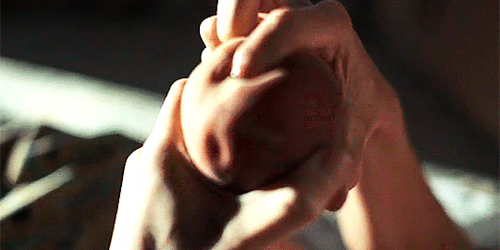
I understand teenagers/young adults are hormonal, horny monsters that would bang anything pulse optional, but NO ONE DOES THAT EVER, and if they do… in the words of my friend Elyse, “Do you boo” (I want my money back). A humorous question does pop up in my head; do LGBTQ people get grossed out at straight people make out and sex scenes? Or do they not really care? Just some food for thought, and in the spirit of these humorous/philosophical points can we say that there is a definite style of gay movies, a “Queer style” if you will? I do not believe there is a queer visual style as after reviewing these movies they seem to be filmed, as any other film would be. Scenes such as Elio in Call Me By Your Name courting Marzia (1:08:20 – 1:09:45) are filmed the exact same way (in daylight and moonlight scenes) as scenes between Elio and Oliver’s (55:30 – 57:20) courtship/blossoming relationship. The way the relationship between Elio and Oliver and the relationship between Elio and Marzia is filmed, specifically how the camera captures it (not the writing or emotions the actors portray) is not stylistically different from each other and therefore at least for this movie does not show any “Queer Visual Style”. I also believe that a queer visual style takes away from the fact that queer, gay, trans, and lesbians are people just like you and me and a stylistic difference in visual portrayal could alienate them and make them seem all too different from regular people. Take Moonlight for instance, that movie is beautifully shot, and although scenes such as his struggle to play soccer with “the boys” (13:51 – 16:51) exemplify that he isn’t soft but something inside Chiron (his gay orientation) lurks behind and gives everyone the impression that there is something different about Chiron and that gives them the impression of him being soft. I see no difference in the visual style of that and say the shot of him learning about the pangs of becoming older and realizing one’s wildness in youth must give way to becoming what he wants to be (19:40 - 21:17).
youtube
In my opinion there is no difference in visual style whether the movie is queer or hetero-normative. Hollywood, in particular a good story has always had the ability to change my mind about many things. And how, you ask yourself, how can a movie “queer me” and surprisingly, Brokeback Mountain did just “queer” me a little. The deep friendship, bond, and further relationship bond made me see that two men can truly love each other and despite all the norms and tradition they break, still have that fond and unbreakable connection 20 years later (The movie starts in 1963 and ends in 1983). It reminded me of my friend Joe and I, and no we aren’t involved like that but I do consider him a second brother and my closest friend. Where I draw the parallel is that despite being hours away from each other they have managed to remain close just like me and my friend Joe have despite me moving some three years ago.
No scene shows this excitement and happiness more than their first meeting after the stint on Brokeback Mountain (1:03:45 – 1:04:25)
youtube
and this scene really shows us as the audience the attachment these two feel for each other (even though it completely doomed Ennis’s marriage but we are not focusing on that). Throughout the movie they meet up throughout the years, their passion still lively as ever, and throughout the movie, even though I am not gay or bear romantic feelings towards my best friend Joe, I kept thinking to myself… “Are me and Joe going to be this close with me in a few years…? Am I? I wonder if we’ll ever go on guys’ trips and do some cool shit before we settle down. And that’s the magic of Brokeback Mountain, it humanizes us and most importantly for its time humanized relationships that were unconventional. And for those who aren’t gay, it made me think about my relationships with my family and friends and how close and tight I am with them, and again even though my feelings aren’t of the sexual or romantic kind towards them… I’m still able to sympathize, empathize, and relate to the story of two dudes separated by time and distance never skipping a beat and having a grand ole time. Of course I acknowledge that they had tension in their relationship especially due to the urging of Jack “Fuckin’” Twist to have them leave their lives behind and start anew together and Ennis rejecting the notion due to a past witnessing of a hate crime, however I am choosing to focus on the closeness and bonding aspect and how people gay or not gay can relate to that and relate it to all their relationships. To quote the character Mr. Bucci from Call Me By Your Name (58:38) “Cinema is a mirror of reality and it is a filter”, LGBTQ people have always struggled for acceptance of who they and this is portrayed in movies such as Brokeback Mountain, Call Me By Your Name, and Moonlight among others, without alienating themselves in a distinct visual and rather being filmed as people like you and me, cause again they are people like you and me, they just vibe a little different.
1 note
·
View note
Text
Today’s song analysis: Because Of You by Kelly Clarkson
(If you’re new to this place, hi. I don’t really focus on the song much. Sorry.)
I can’t remember how old I was exactly when I first heard this song. Primary school? I didn’t have the CD or anything, so I guess somehow I managed to grasp the entire song from listening to it playing overhead in the shopping centre.
(Quick note: If Kelly Clarkson herself has said anything about what this song means to her, I have no knowledge of it. I’m here sharing the story I got from this song personally, with no other source except listening to it.)
So. In terms of storyline, it’s pretty straightforward:
The Speaker is addressing their Parent. Their Parent was in an unhealthy, probably abusive relationship with another person. As a result of growing up with this happening to their Parent, the Speaker is unable to let down their walls and trust anyone else in their life now, and it’s highly disruptive to their ability to live.
I originally thought, as a child, that it was a straightforward song blaming the parent for getting into an abusive relationship at all. In a way, the Speaker blames the Parent for not taking care of themself better, because it had an automatic impact on the Speaker even as a bystander in the scene.
But that’s not all, is it?
I realise when I listen to it as a young adult: It’s not about the situation. The Speaker isn’t actually so naïve so as to blame their parent for something they aren’t at fault for. Instead, the Speaker blames them for not protecting them.
And here, I don’t mean ‘protecting them’ as in protecting them from attacks themself, I mean protecting them from the knowledge that was going on. The Speaker says “I was too young”. Allowing their child to witness the abuse at all was where the Parent failed. It’s not the fact that the Parent was in a scary-looking relationship — it’s the fact that the Parent showed them, again and again, how painful and terrible it was.
Imagine it like having a child see movie characters shoot each other, versus the extended dying scene where they see the character’s body die slowly with a pg-13 slapped on it. These scenes are pg-13 for a reason. /j
The Speaker says it explicitly: “I watched you die”
I’m not sure whether this is very clear, so let me interject with a slightly personal example.
So, a family unit that I’m very close to is going through a difficult time right now, a long-coming explosion that’s finally been catalysed by COVID-19. I’m close to the children, as well one of the parents. There’s no need to explain what the full situation is: currently the parent is trying their best to appease their partner for the sake of their children. It is, I think, a common statement for a person to say that they’ll stay in a marriage just for their children.
Listen up: You are a parent. You have a responsibility to a child, who honestly should be the first and foremost thing in your mind, because you’re responsible for this human being in its entirety.
So I don’t think that the motive itself is wrong, but it’s worth it for anyone who says that to take the time to step back and consider that statement. You want the best for your children, correct? Then think about your options, and whether staying in a damaging relationship is really ‘the best’ for your children.
It might be. But it’s not automatic. It just isn’t.
This isn’t the place for a whole spiel on my opinions of divorce, but let me start with this: If your children know that their parents are constantly hurting each other, are constantly walking on eggshells, and are constantly seeing their loved ones cry, then they’re already affected. This piles up, and if your children don’t learn that people can’t be trusted and distance themselves from others completely, then they’re going to learn that this is how a normal relationship works and grow up to be the next victim or abuser.
This parent in my story is trying their best not to involve the children, which makes me relieved that they at least know to try.
I always think open communication is good with children. Children don’t need to be sheltered from every little bad thought in the world, and it helps for children to have an accurate understanding of the world, and gives you better ground on getting your child to see your side of things (when my parents give me advice with an explanation, it definitely increases my chances of listening). But that doesn’t mean ‘treat your children as adults’ or even worse, ‘treat your children as your personal therapist’. Yes, children are fragile. Even adults are fragile. And you, as a parent, have the responsibility to make sure you don’t traumatise them.
Here’s another analogy: You know your child will fall down, physically, many times in their life, and sometimes it will be painful and potentially even leave lasting damage. You might be the type who lets your child fall down while they explore, because you don’t want to coddle them when they inevitably grow up and you can’t watch them twenty-four seven anymore. That’s fine. But if they’re a tiny infant and their clearly too fragile to take a fall — DON’T LET THEM FALL. You hold on tight to them because you know that while they’re gonna have to be exposed to falls one day, they’re literally not physically ready to handle that yet. If your infant falls, they might get severe head trauma or spinal cord injury or anything, and then you’ve just messed up at the very start of your parenting. And then when they’re a little bigger, and they can toddle around, do you let them fall off the top of the monkey bars? NO. Because no matter how old, some falls are just going to be too supremely bad, and you don’t want your child to end up in the hospital with broken bones if you can help it.
This is the same concept. Your children have a mental trajectory, just like they have a physical one. In the same way, it varies considerably from one child to the next. There’s no need to go around talking about how some children are ‘way more mature than others’ because, yeah, that happens. That still means it’s a continuum. To be honest, a child can be doing great discussing social movements with their friends and then not be able to take the emotional toll of coming home to a warzone every day. Adults are like this too. I promise you that thousands of people who watch Avengers totally won’t be able to take the emotional stress of an actual alien invasion.
As a child, I was aware that my parents had very little money. It’s a little hard to grab an adjective, but I’d say I felt ‘negative’ that I couldn’t buy things like my friends could and my parents were rarely at home, as far as I was concerned. But I never fought with my parents on these money-related issues, because I understood the reasoning behind why I couldn’t have what I wanted. But I was also very secure, because my parents made it clear to me that they had it all under control. At stores, I could negotiate purchases with my parents, because I knew I couldn’t comprehend how much we could realistically spend, and I knew that my parents wouldn’t give into me if it would make our lives harder overall. They never gave me the opportunity to even consider that they might not be able to send me to university. This means I grew up pretty secure in terms of money, despite having significantly less than my peers at the time — not that I could spend a lot, but that I didn’t have to worry about it, as a child.
My parents were being honest about their expectations for how our situation would go. In a lot of situations, like unhealthy relationships, forget honesty when you can’t even see the future yourself. But you still need to shield your child a little. They’re still learning about life, love, relationships, confrontation, aggression, problem-solving, self-respect, self-protection, and more. What my parents taught me about money and spending carries on until today — I have zero concept of money apart from whether I have it, buy things only on impulse, but buy absolutely nothing. For the past several years, my parents have dragged me out on shopping trips trying to get me to buy new clothes, because I would never buy myself them until my old clothes wore out beyond repair. This is my money model, and it’s not the worst but it’s also not the best, and I have it because it’s the model I grew up with in my formative years.
So back to the song. The Speaker says they will be stronger. But this isn’t going to work. They’ve learned the desire to be loved from their Parent, so they can’t really close off their heart from danger completely, yet they can never truly open it up. Furthermore, they only have this one model of a relationship, so they’re left only with this vague idea of being ‘stronger’. And lastly, they have trauma from sharing the experience of what their parent went through. Oh, and one more thing, “I will not cry, because I know that’s weakness in your eyes.” Yeah.
#I don't know to end this#but I think I've said all I have to say#I know I said a couple of personal stories in here but they're kinda surface too#I do love this song cause it's one of my very old songs#phoenixglacier writes#song of the day#Because Of You by Kelly Clarkson#nooo why is my formatting so terrible#phoenixglacier’s words
1 note
·
View note
Text
A Feline’s Family - MariChat May 2019
Buy Me A Coffee?
AO3
Chapters (If there’s no link, it’s not written yet)
1 2 3 4 5 6 7 8 9 10
11 12 13 14 15 16 17 18 19 20
21 22 23 24 25 26 27 28 29 30 31
Day 18 – Balconies
Ladybug released her yo-yo string, somersaulting in mid-air before dropping to the concrete below. Her transformation melted away as she landed, Tikki spinning out of her earring with a giggle that was bound to haunt her for a few days.
“Your face is almost the same colour as me!” the little red bug squealed in joy, tiny arms coming up to cover her mouth.
“Tikki! Shh!” Marinette squeaked, mortified, “He’s right behind us. He’ll hear you!”
If she had thought Chat’s flirting had been the most difficult thing to try coping with before, she had seriously underestimated the rest of the people in her life.
She had even stupidly thought school was going to be a relief from the constant barrage of pick-up lines.
Instead, she had found that school was a daily test of her ability to fight down her traitorous blood supply from flooding her cheeks with colour – as Adrien seemed determined to spend as much time as possible in her company. Alya was merciless in her ribbing about it, keeping it relatively low-key while he was around before completely tormenting her once he disappeared for so much as a second. It also hadn’t helped that in the lead up to their reveal, Marinette had been non-the-wiser to the boy’s sudden burst of interest in being around her – which Alya now thought had all been for show.
“I still don’t get why you didn’t just tell me he was sneaking out to spend the night at your place regularly,” she had said yesterday, “I would’ve happily listened to you scream with joy.” Marinette reddened even further as she remembered how she had been awkwardly balancing Alya’s teasing with keeping Adrien out of earshot without accidentally upsetting him by keeping her distance. A fact Alya was taking great pleasure in exploiting, knowing if she spoke low enough, Marinette wouldn’t be able to retaliate without him realising something was up. “I could’ve even clued you in sooner that he’d started crushing on you.”
Because it made sense to her best friend (and from the knowing looks thrown her way, Nino too) that Adrien would’ve picked the girl he liked when he started acting rebelliously towards his father and snuck out to visit a girl. At night. In her bedroom.
Especially given Adrien’s newfound style of flirting with her – in front of everyone. It was a more reserved form compared to Chat’s usual bravado and she had uncomfortably discovered that it both exhilarated her and turned her insides into jelly. The death glares she received from Chloe and Lila certainly hadn’t helped her to relax either. But then neither had the shrewd glances from her classmates, and other friends around school, whenever Adrien referred to the bakery as home.
And really, why else would the Dupain-Chengs have wanted to foster Adrien instantly after the news of his father’s villainy broke, unless he had already been a constant addition to their lives? There had been no logical way to explain and still hide her status as sleepover friend from anyone who knew them – at least not without creating a hundred difficult questions she couldn’t exactly answer without endangering their own identities.
“I’m pretty certain your parents and Master Fu have already said much worse in front him tonight than I ever could,” Tikki chuckled, bringing Marinette back to the moment. She groaned, hiding her face in her hands at the memories of all the ‘couple’ talk the three adults had used when referring to the two of them.
Her and Adrien had finally found time to fill Master Fu in on the situation completely, including that they now knew each other’s identities, and that their parents were also in on the secret. It had been an uneasy wait for the reporters and police to back off enough that they could move around without fear of being followed, though they had still played things safe and acted as if they were introducing Adrien to a family member, in case anyone noticed.
At Tom and Sabine’s insistence they had arranged a meeting as soon as they thought it was safe for them to get to know each other – and so her parents could ask any questions the kids might have been unable to answer, or not thought to ask. Family movie night had needed to be sacrificed, but Marinette had been sure it would be worth it. At least, until the teasing had started, and she once again found herself wishing she was able to melt through the floor at will.
No shouts of, “Mama!” “Papa!” or “Master!” had made a difference and Marinette had resigned herself to a fate of death by humiliation as Master Fu had gotten around to explaining that he had tried to pair up two young souls who he thought were “made for each other.” She had absolutely refused to look Adrien in the eyes during that part, but she still managed to catch his shy, embarrassed smile in her peripheral vision when Tom had reached over to muss his hair right after.
There was a muffled thump on the balcony behind her, indicating Chat had finally arrived home. He often liked to stay to the shadows and circle back on himself to ensure no one spotted where they were headed –and normally she did too– but she had been so flustered by everything going through her mind tonight that she had neglected her usual caution and taken a more direct route. But he had finally caught up to her, and now they were both home.
Together. Alone.
And she still had no idea how to bring up her own feelings with him, even with all the constant teasing making it the elephant in the room most days.
“Hey, My Lady? How long do you think your parents’ll stay chatting to Master Fu?” he asked with a tone of almost forced casualness, “Like, should we wait for film night? Or maybe we should just watch one in our room? Just the two of us?” She turned to see him scratch at the back of his neck awkwardly, a hint of nerves evident in the wrinkle of his brow. “Just, it’s getting kind of late, and they’ll have to be up early to work the bakery tomorrow. And I don’t know if you’re worn out from all the…from the talking, but I’d like to do something.”
Biting her lip to hinder her first instinct –which was to push him away by the nose and make a quick getaway– Marinette smiled shyly at him. Her head dropped a little despite how hard she tried to cling on to her depleting confidence, and she found herself glancing up at Chat, almost through her eyelashes.
“Sure,” she said, and as much as she tried for a normal voice, her words came out tender and full of some unspoken emotion, “Why don’t you go find something you think I’ll like?”
Chat blinked at her for a moment, eyes wide and owlish before he shook his head and gave her a weak smile. “I’ll go have a look then,” he said, clearing his throat so his own voice sounded more natural, “You know, this is one of the few times I’d love to have access to my stuff at the mansion. There’s a ton of stuff I’m dying to watch with you.”
She watched as he dropped through the skylight and presumably began to rummage through her family’s collection of films in the main room. She sighed as she considered his parting words. It didn’t seem to bother him that he was only allowed to keep some bare essentials from his time at his father’s, but it was still clearly a weight on his mind to know that everything he owned was being searched through repeatedly on a daily basis, along with everything else in the mansion. Then there was the constant stream of questioning from the police and their reminders that Gabriel’s assets were being held, as well as keeping him informed of any supposed progress in their full searches of the company premises, and certain employee’s homes. Marinette often wondered if they suspected him and were just looking for telling reactions; or if they genuinely wanted him to know how everything was going, given how in the dark he’d been about his father.
“So, I was stuck between an older classic,” Chat breathed against her ear, making her jump a little in fright, “and I know it’s only from 2003 and your dad would kill me if he heard me say that, but it’s Love Actually! That’s a classic, right?”
Marinette fought off the trembling that threatened to give away how nervous she felt. She wasn’t entirely sure if it was from the shock at his sudden appearance, or the way his mouth had been so close to her ear that she had been able to hear the sounds his lips made as they formed the words before his voice broke through. Or even if it was the ungodly amount of discomfort she got from the thought of watching that film with him – given how she remembered first seeing it with her mama in the room and feeling utterly mortified at some of the scenes. She somehow managed to step away and turn to face him without belaying her emotional distress, and then nodded gently in response to his question.
“Or,” Chat continued, “There’s this one – About Time? I’ve never seen it, but I wanted to. Is it good?”
“Um-” she quickly ran over and snatched the DVD case from his clawed hand, “-maybe that one isn’t the best for you to watch. It has a bit of a theme about…” As she trailed off, her eyes screwed up a little and she remained alert to how he might react, ready to offer support if he needed it.
“…Losing family?” she finished tentatively.
For a moment she regarded his rapidly dampening eyes –full of unshed tears– before he turned and wiped at them furiously with the back of his hand. When he was done, he moved towards her and she was still straining her mind to work fast enough to react when he pulled her into a warm, tight hug against his slightly heaving chest. She hugged back as best she could, his cheek resting on the top of her head and DVD case pressing against his back awkwardly as she tried to wrap her arms around him.
“Thank you,” he breathed, voice cracking and sounding slightly watery, though she didn’t feel any tears against her hair or clothes, “You’re always thinking of me. Thank you.”
Only a moment later, she felt his breath even out a little as he regained his emotional strength once more, breaking the hug almost hesitantly to look at her instead. “So, Love Actually?”
She smiled. “Love Actually.”
“Okay!” he said, suddenly grinning and far too cheerful, “Uncomfortable simulated sex scene it is!”
She squeaked and crumpled to the floor, where she remained for a solid twenty minutes before he finally managed to convince her to come downstairs, despite his own fit of giggles.
Buy Me A Coffee?
29 notes
·
View notes
Text
Mariah Carey: Top 10 Most Iconic Songs
To celebrate the holiday season, which has really become the season of Mariah Carey this year, and “#All I Want For Christmas Is You” finally becoming a #1 single, I am sharing with you my “Top” lists of MC songs every Monday and Tuesday up until the 25th. For example, we’re going to start things off with the Top 10 Most Iconic Mariah Carey songs; on Tuesday, we’ll look at remixes. All songs mentioned these lists can be found on streaming services (e.g. Spotify and Apple Music). That means deep, deep cuts like “Slipping Away” off the B-side of the “Always Be My Baby” single, and “Help Me Make It (Through the Night)”, Mariah’s cover of a country song, which aren’t available, aren’t included. Unfortunately, that also means the entire Glitter soundtrack will not be mentioned as it is not yet available for streaming. #JusticeForGlitter #Loverboy2020 Let's make Loverboy MC's 20th #1 in 2020!!
To explore the most iconic MC songs, we have to look at streaming numbers (based on Spotify data, accurate as of Dec. 2019), MV views (based on YouTube data, accurate as of Dec. 2019), appearances on concert set lists, but also it’s prevalence outside of the Mariah fan base. “Butterfly” is an iconic ballad within the fan base, but pales compared to another empowering song like “Hero”, which non-MC fans most likely know even if they hate Mariah.
Is the list TL;DR? No worries. I compiled each list into a respective playlist, starting from No. 10 and ending at No. 1, so you get to listen to the Most Iconic MC songs while on the go.
https://open.spotify.com/user/jdiep95/playlist/1T0OU0p1cjR82LV1XX7f7j?si=AT9_aL0kSgmxySvIasZjsw
10. “My All” Butterfly
No. of streams: 37 182 150
MV views: 142M
“My All” makes its way into almost all of MC’s concert set lists since its release in 1997, appearing most recently in Mariah’s Caution World Tour. In this way, it gathers a lot more exposure than some of her other #1’s, such as “Dreamlover” or “Honey”. Despite its relatively low number of streams compared to other songs on this list, the number of views for the main music video is actually placed sixth on this list, and for good reason. The MV for “My All” is arguably the most artistic of MC’s catalogue, if not at least the steamiest. The video is in black-and-white, and features Mariah Carey floating on water with cutscenes of some hot model. The song appeals to a more specific audience, mainly adults, but the incorporation of Latin guitars will evoke a certain headiness seen only in a handful of Mariah songs.
9. “Vision of Love” Mariah Carey
No. of streams: 25 938 743
MV views: 25M + 2.6M*
*Includes a live version from the Daydream World Tour released on Mariah Carey’s official Vevo channel
This may be confusing; overall, “Vision of Love” received the least views and least streams of any of the songs listed here. Why is it not last on the list? Unlike “My All”, this song is one for the entire family. Don’t believe me? Many popular artists of the 2000s cited this song as their inspiration, including the great Beyoncé. Besides the complex runs, which becomes more complex in the live version, “Vision of Love” is a peer into Mariah’s vocal range, from her lows (E♭3) to a signature whistle note (C7), and a blend of genres, including pop, R&B and gospel. Even if it spawned a generation of over-singing vocalists, this was MC’s debut, a tour de force that inspired a new generation of singers. And thanks to its prevalence in Mariah’s concert set lists, it could very well even be inspiring this new generation.
8. “Fantasy” Daydream
No. of streams: 85 048 626 + 24 904 151*
MV views: 58M + 11M*
*Includes the “Bad Boy Fantasy Remix” featuring O.D.B.
“Fantasy” is a bop, and arguably the song that pushed Mariah to super stardom. Despite being nominated in six categories and controversially winning nothing on the night of the 38th Grammy Awards, Daydream cemented MC’s status in the music industry. “Fantasy” was the album’s leading track, and it became the first ever single by a female artist to debut #1 on the Billboard Hot 100 chart. It stayed there eight consecutive weeks. If the pop version isn’t iconic enough, with the music video featuring Mariah riding on a roller coaster, the remix with O.D.B. is arguably just as famous, if not more so. The “Bad Boy Fantasy Remix” introduced the featured rapper formula into mainstream music, a formula that’s practically standard in the industry nowadays.
7. “Always Be My Baby” Daydream
No. of streams: 148 422 869
MV views: 162M
Yet, the numbers for "Fantasy" cannot compete with this song. A reason for this is perhaps a lack of airplay; “Fantasy” is danceable but there’s no hook.“Always Be My Baby” was the third single off the Daydream album. After breaking records with “Fantasy”, by debuting at #1, and “One Sweet Day”, for logging 16 weeks at #1, “Always Be My Baby” debuted at #2 and logged only 2 weeks at #1; however, the stats show how age has affected the song’s popularity with the MV views for “Always Be My Baby” doubling those of “Fantasy”. “Fantasy” takes more of a backseat in Mariah’s concert set lists. “One Sweet Day” almost faded into obscurity before it made a resurgence this decade when songs like “Despacito” and “Old Town Road” rivalled its chart records; it’s also made a reappearance on set lists. All of this is to illustrate that “Always Be My Baby” has always been a staple, a favourite amongst fans and the general listeners. The song has many great Mariah moments, but what really latches on and sets the ground for “Always Be My Baby” to play on is the opening “Doo doo doo”. This song does what “Fantasy” didn’t do, and that’s creating a feeling. The song and the music video is a perfect pairing. You listen to the song, and you are reminded of sitting by a firepit, reminiscing about a significant first love that’s no longer, the exact imagery that’s been replicated by the MV; this is probably why it has so many views.
6. “Touch My Body” E=MC²
No. of streams: 64 797 196
MV views: 185M
“Touch My Body” is Mariah’s second-most recent #1 single of her 19 chart-toppers, and the leading single to the 2008 album E=MC². Although its release was in the middle of February, the song really transports you to an eternal summer. The song received its fair share of critiques, including more than a couple that said “Touch My Body” lacks Mariah’s 5-octave range; nonetheless, if MC’s previous album, The Emancipation of Mimi, was MC’s comeback, this single solidified her status as 'the diva' with a new decade of listeners. It’ll be wrong to think, however, that Mariah wasn’t in on all the fun as well, and this is why the MV has its views. The music video is a fantasy sequence of Mariah flirting with Jack McBrayer in a mansion. After her comeback, this was Mariah’s way of going back to doing something that defied the critic’s expectations. With The Emancipation of Mimi, she proved that she still got it — the range, the ability to write hits, the star power; "Touch My Body” brings back the Mariah we have come to love in the past decade — the extravagance, the luxury, the seeming aloofness. For a moment, “Touch My Body” captures MC having fun, and the simple structure of this song reflects that.
5. “Obsessed” Memoirs of an Imperfect Angel
No. of streams: 82 625 131
MV views: 127M + 15M*
*Includes the remix featuring Gucci Mane
“Obsessed” gained new life this year, ten years after its initial release in 2009, with the #Obsessed challenge on TikTok. Teens were creating choreography for this song, and simultaneously propelling Mariah to becoming Queen of Memes, one of MC’s many titles. The opening to “Obsessed” breathes new life into a line borrowed from one of Mariah’s favourite movies, Mean Girls, “Why are you so obsessed with me?” This line, along with “I don’t know her”, has its place in meme culture. Besides its relevance to a new generation, its iconicity can also be contributed to the fact that it's a high profile diss track that attacks Eminem’s harassment, but it’s pop, not rap. Its conception introduced a new generation of pop artists to using their tracks as a way to call-out others. “Obsessed” resurfaces perennially when Eminem decides that his almost-two-decade old alleged fling with MC somehow deserves another mention. Maybe she’s the best thing to have happened to Eminem? Lyrically, “Obsessed” is one of Mariah’s sharpest, with her directly calling out Eminem’s desire to make something out of nothing; see: “you hatin' hard/Ain’t goin' feed you, I'm a let you starve/Graspin’ for air, and I'm ventilation/You out of breath, hope you ain't waitin’.”
4. “We Belong Together” The Emancipation of Mimi
No. of streams: 210 251 706
MV views: 399M
“We Belong Together” is Mariah’s comeback track. Regardless of whether she knew this song would make it big when she was writing it, this song would live on in the history books as the song that told skeptics that Mariah ain’t going anywhere. “We Belong Together” is very stripped down — it’s Mariah singing on top of a piano and a beat, then Mariah singing on top of herself in the chorus. For a song about unrequited love, which Mariah usually packages as being more upbeat than it should be (see: “Always Be My Baby” or “All I Want For Christmas Is You”), “We Belong Together” is incredibly visceral. It’s a sad song and it shows, and somehow Mariah communicates the frustration and swirling of emotions so well that you might even tear up by the end when she holds that fifteen-second note. The other unique thing about this song is that she sings the lyrics as if it’s a rap, very reminiscent of her earlier hip-hop inspired tracks like “Breakdown” ft. Bone Thugs-n-Harmony, an overlooked fan favourite. Try singing it without ever practising, and you’ll find that MC placed words in a very specific rhythm. This song also introduced the ‘Mariah-ballad structure’, a formula that she continues to follow for many of her ballads: It consists of an absent bridge with a belted last chorus that takes its place. And as for the MV, Mariah elopes with a lover in a car while wearing the same Vera Wang wedding dress she wore at her real-life marriage is as iconic as it gets.
3. “Emotions” Emotions
No. of streams: 41 251 987
MV views: 32M + 2.7M* + 9.9M**
*Includes the Club Remix
**Includes the MTV Unplugged live version, and the 1993 Here is Mariah Carey live version
There’s a reason “We Belong Together” didn’t crack the Top 3: It’s strictly a song about unrequited love. Mariah, alone, has quite a few of those in her catalogue. And there’s only oh-so-many occasions in which to bring back this song unless it’s already part of your daily repertoire. If Minnie Riperton’s “Lovin’ You” takes first place for the most iconic use of whistle notes in a pop song, “Emotions” no doubt takes second; however “Emotions” has to take first for inspiring every pop singer and their grandmas to use whistle notes, from Christina Aguilera and Leona Lewis to Ariana Grande and Tori Kelly. Yes, “Emotions” is a love song, similar to “We Belong Together”, but it’s also a learning tool for many aspiring pop and R&B singers — this song is a resource. It’s like learning music theory and referring back to Mozart and Beethoven. “Emotions” contains those whistle notes, all the up to an E7, but it also contains low notes (several C3s), high belts (F5s and G5s), head notes (the “You” in G5), repetitive phrasing from C5 - E5, a couple of sustained E5 belts, and melismas. In the live versions, you really get to observe MC’s stamina as we goes through the song with ease. And if you compile all of the live versions of “Emotions”, Mariah demonstrates five full octaves from B2 to B7. Simply put, “Emotions” is an encyclopedia of vocal virtuosity for rising and seasoned singers.
2. “Hero” Music Box
No. of streams: 99 556 980
MV views: 236M + 5.7M*
*Includes a live version from the Daydream World Tour
There’s a thing about “Emotions”, and it’s best if I told you through an anecdote: I played this song in a classroom once, and one of the 5-year olds asked why she [Mariah] was screaming in the song. Blasphemous, I know. Arguably though, the whistle notes are more well-known than the actual song itself. But “Hero” is one of those instances where you know the song, even though you don’t think you do. Just listen to those opening piano notes; flashes of the entire song will surely follow. Not surprisingly, this is the first ever MC song I’ve ever heard; I heard it when I was seven because we had to perform an ASL version of it, but I didn’t know it was Mariah at the time. I didn’t know until possibly a decade later when I thought back on the signs, and the lyrics “And a hero comes along” popped into mind. Obviously, this list is tinged by my own biases; however, “Hero”, this song about loving yourself, and finding that hero within yourself, is special, not only to the fan base, but to anyone who needs a pick-me-up, even if they’re not Mariah fans. It’s radio-friendly; it’s singing competition-friendly (it only goes up to an E5, a mid-belt for Mariah; for reference Idina Menzel goes up to E♭5 in “Let It Go” and “Into the Unknown”); it’s graduation-friendly; and it’s concert-friendly, considering Mariah almost always ends her concert with “Hero”. It’s a sappy song, one that Mariah initially didn’t like, but she explains that she sings it every time because you never know who might need it.
1. “All I Want For Christmas Is You” Merry Christmas
No. of streams: 595 428 506
MV views: 602M + 11M*
*Includes the alternative Black & White version, and Unreleased Video Footage version
Perhaps you can avoid unrequited love, high notes, and graduations, but in North America, can you really avoid winter? With winter comes holiday season comes Mariah Carey, Queen of Christmas comes “All I Want For Christmas Is You”. Released in 1994, this song has finally reached #1 on the Billboards Hot 100 after 25 years. MC released a handful of versions, including a re-recorded, Disney-sounding version in 2010, and another with Justin Bieber in 2011, but let’s make it clear that the version that makes a resurgence every year, and that we all hear on the radio, is none other than the original 1994 recording. The original recording which was never released as a single was not allowed to chart in ‘94, but ever since Billboard updated its rules to allow songs to re-chart in the Top 50 in 2012, “All I Want For Christmas Is You” has made a reappearance every year. It broke into the Top 10 for the first time in 2017, then the Top 5 in 2018. It’s hard to best something when it’s already so close to perfection, if not perfect. “All I Want For Christmas Is You” is such a definitive holiday-pop standard that it’s been broken down into a two-part formula. The formula finds it’s way into many of the new released Christmas songs hoping to make it big, which in some ways are their downfall because it sounds disingenuous, particularly in a season where sentimentality drives sincerity, or at least the façade of it. This two-part formula that it has inspired includes: (A) Wrapping up a unrequited love song to sound like an upbeat Christmas song; and (B) The “Wall of Sound” sound originally created by Phil Spector, which includes a underlying chorus line, a strong accompaniment, and the use of symphonic instruments. You’ll find at least one, if not both, pieces of the formula, whether it’s intentional or not, in recent holiday songs such as “Mistletoe”, “Underneath the Tree”, “One More Sleep”, “Santa Tell Me”, and even “Christmas Tree Farm”. Walter Afanasieff, the co-writer of this song, said, “Back then, you didn’t have a lot of artists with Christmas albums,” and with that he meant in the ‘80s and ‘90s, rising stars didn’t record an entire studio album's worth of Christmas songs. Whitney didn’t have one yet, Madonna didn’t have one (and still continues not to have one), Michael stopped doing them when he recorded under Epic Records in 1979; and y’alls are probably thinking of Wham!’s “Last Christmas”, but that was a single. Despite Mariah initially not wanting to do a Christmas album, and as pessimistic as this may sound, Merry Christmas has re-introduced the lucrative Christmas song business to pop singers.
We may remember this decade’s Mariah — a diva with shaky performances, but this two-dimensional image erases the gut-wrenching, tear-jerking efforts she put into the two previous decades. MC was a trailblazer, and continues to be one as you will see in the upcoming lists. To say that Mariah leans only on past achievements, and relies too heavily on titles like “Queen of Christmas” or “Queen of Memes” diminishes the fact that the upkeep of the legacy she’s built for herself requires time and hard work.
#mariah carey#all i want for christmas is you#merry christmas#song list#playlist#spotify#JusticeForGlitter#Loverboy2020
2 notes
·
View notes
Text
The Devastating Impact of AB5 on People with Disabilities and Their Families
This month, sweeping economic changes to the way Independent Contractors are able to conduct business became chiseled into law in California. Despite protests from hundreds of thousands of California’s tax-paying citizens, Lorena Gonzalez-Fletcher, author of AB5 which codified the Dynamex ruling of 2018, was unrelenting in her stance that the majority of freelancers without business licenses should legally be classified as employees. There were carve-outs in the law, however, they are primarily arbitrary, absurd, and not reflective of how Independent Contractors actually work. The law caused financial devastation for a substantial segment of California’s population, including people with disabilities who are working or who have worked, and their families. This article provides and in-depth look at the challenges they face, and explains why a business to business exemption is not possible in a majority of cases, and is ableist and discriminatory.
Working While Disabled
For people with congenital disabilities or those acquired from an accident or illness, facing the social, financial, and health-related barriers to traditional employment can be devastating. According to the Department of Labor, the percentage of disabled people who work is only 19 percent. For many of them, education and training do not level the playing field, as employers are often resistant to making offers of employment to candidates who they fear may need adaptations to the work environment, miss excessive amounts of work due to health issues, or require extra time to complete tasks. While their concerns can be completely unjustified, employment biases are still a reality people with disabilities face. Working as an Independent Contractor circumvents these issues and allows individuals to acquire work based on their unique skills, talents, and abilities—not on an arbitrary body standard that they cannot meet. It also allows them the freedom and flexibility to choose the type and volume of work that will not exacerbate health issues. While this may mean less income initially, they often end up with a better quality of life and more disposable income because they do not have to incur additional work-related expenses or health issues.
Working independently from a home office also has other less-obvious benefits for those with disabilities, including:
Less physical and emotional stress which can cause further decline of health, or create co-morbid conditions such as high-blood pressure.
Less wear and tear on their bodies which, for people with life-long mobility impairments, can help stave-off post-impairment syndrome (severe arthritic changes that further degrade health and mobility).
Elimination of the significant challenges of getting to and from work, particularly for those with vision impairment, epilepsy, or a disability that prevents driving such as Hemiplegia.
The Cost of Disability
Being disabled, or having a disabled family member can cause a significant financial strain on families that can be offset with some paid part-time work. The following statistics were taken from the Morbidity and Mortality Weekly Report (MMWR). Lifetime costs for the following common disabilities are:
· $921,000 (persons with Cerebral Palsy)
· $383,000 (persons with hearing loss)
· $601,000 (persons with vision impairment)
Additionally, the Christopher and Dana Reeve Foundation estimates the annual cost of living with a spinal cord injury at $42,000 to $184,000 per year. The figures for Multiple Sclerosis are even more daunting: an estimated lifetime cost of 4 Million Dollars.
If you, or a loved one has a disability, you know that if you/they are on SSDI, thousands of dollars of medical, dental, durable medical equipment, and pharmaceutical expenses per year are not covered and are the responsibility of the patient and his or her family. The Medicare website estimates out-of-pocket costs to be approximately between 7-8K annually for a healthy retired person. For a person with a disability who has hefty drug co-pays or needs uncovered durable medical equipment such as a lift in order to take a shower, help with activities of daily living, or who requires surgery for any reason, those costs are significantly higher.
While a fraction of people with disabilities can get extra help from another entitlement program, SSI, this is extremely difficult to qualify for, particularly if you have worked for a number of years, and have more than 2K in assets (not including the home you live in or a vehicle). The conundrum is that if you have a disability, you need savings for emergencies. For example, if a needed piece of DME like a wheelchair breaks, the approval process for a new one can take months leaving the disabled person home or even bed-bound during the wait. If one is disabled and has a working spouse, the odds of qualifying for help are almost non-existent, as the monthly income limit is $1,175 for a couple—barely enough to cover rent in most California locations.
On SSDI and Disabled
In order for someone with a disability to qualify for SSDI he or she must have earnings over a set amount for at least 40 quarters, and meet detailed medical criteria. Many applicants to the program must wait years to have their cases heard before an Administrative Law Judge who will analyze medical records and statements from Doctors and other medical professionals. Someone with, for example, mild Cerebral Palsy, who was an independent ambulator in their youth, in their late 40s and 50s may have declined physically from post-impairment syndrome that requires them to use a walker or wheelchair, impacts the use of their hands, and causes them significant pain which must be treated with muscle relaxants. Likewise, someone who was diagnosed with Multiple Sclerosis in his twenties may be quadriplegic in his 40s. In any case of someone receiving SSDI, he or she has experienced a significant decline in function that impairs the ability to work.
This does not mean that the disabled individual cannot work at all. In fact, the Social Security Administration allows for individuals to do a small amount of work. It sets caps on what can be earned per month (for 2020, the amount is $1200). If the disabled individual earns above this amount for nine non-consecutive months or more, he or she is found to be engaging in Substantial Gainful Activity (SGA).
The AB5 Business License Exemption
Gonzalez has proposed a work-around for Independent Contractors: a business license. A business contracting with another business can be exempt from AB5. According to her, even being a Sole-proprietor meets the requirements of the law. For people with disabilities on SSDI, this “option” will threaten needed benefits including healthcare. Owning a business obliterates the SGA rules when it comes to SSDI because one can be found to be non-disabled based on combined income earned, and the extra unpaid time spent running the business (see the regulations). This can cause benefits to cease, regardless of income generated.
More so, many companies who continue to work with California freelancers are requiring that they have an S-corp or LLC. While this is understandable, as these companies are trying to protect themselves, it does not bode well for people with disabilities and their families. The cost of the license itself is also prohibitive for family members who may be Independent Contractors-- $800 per year for an LLC., for example.
Family and Spousal Caregivers
According to the Family Caregiver Alliance, 43.5 million caregivers have provided care to an adult or child in the last twelve months, with 32.5 million of them providing care to an adult age 50 or older. The estimated economic value of the unpaid services they provide is 470 billion dollars annually. Seventy-five percent of all caregivers are female, with an average age of 49.2 years.
Family and spousal caregivers are often forced to balance their time between paid work and caregiving duties. Many have to leave the traditional workplace environment early due to the care needs of their loved ones. It is this group that most benefits from the flexibility that Independent Contract work permits. It should not, under any circumstances, be further burdened by needing to incorporate in order to work.
Gig-economy Businesses That Benefit People with Disabilities
There are many online businesses that make life with a disability easier. Some of the basic conveniences that an able-bodied person can take for granted like grocery shopping, driving to doctor’s appointments, or picking up prescriptions can be a strain for people with disabilities. With the average cost of an agency-vetted personal care assistant at 26 dollars per hour or more, and most agencies requiring a four-hour or more minimum, gig-economy businesses can provide needed services at a fraction of the cost. Uber, for example, charges the same rates for WAV (wheelchair equipped vans) and ASSIST (extra help for people who need it) as they do for standard UBERX. Instant Cart provides grocery shopping services at a nominal cost (they will even put the groceries away). Postmates will make pharmacy runs for a few dollars. Because of AB5 rules and corresponding litigation, rates for services like these have increased, with people with disabilities being among those footing the bill.
When a Law Becomes Punitive
Gonzalez, in a recent interview with KUSI repeatedly stressed that Independent Contractors without business licenses, as well as businesses who contracted with them were working outside of the law since Dynamex. She neglected to mention Independent Contractors pay taxes according to IRS regulations, and are overwhelmingly choosing contract work over being employees. If Dynamex and its codifications, AB5, are in opposition to California citizens earning an honest living, then they should be repealed. This country has endured plenty of bad laws that victimized and segregated citizens—among them Jim Crow laws—and those public servants who who voted for and uphold AB5 are continuing this bigoted, harmful history.
1 note
·
View note
Text
Why do I keep doing this?
It’s nearly over, there are fewer than 100 pages left in the horrid thing after this one.
((Oh also, these few chapter contain a hell of a lot of really casual racism mostly against Native Americans and whatever “half-breeds” are, because that’s not specified.))
Okay, chapter 18 starts with finding out that the stroke didn't kill Mother it did, of course, exactly what Mizpra wanted: Left her a mostly paralysed invalid.
Despite that, she's written as still being pretty mentally lucid, just not physically capable of doing much but being propped up in a chair facing a window. Now somehow she's being called "The mother of Leigh" instead of Mrs. Newcomber.
Anyway, she's staring out the window, occasionally being annoyed by the fact that her nurse is a "strange and harsh woman" and how she's a toy of Mizpra's now somehow.
It's also somehow "perverted" of Mizpra to let her mother reminisce about when she was younger but okay.
Watching birds is supposed to make one cry; I'm guessing mabye I watch birds incorrectly because, while interesting, I've never really felt any sort of urge to cry over them.
Mizpra evidently thinks, "partially paralysed from a stroke" means "also deaf" and is now always written shouting right into her mother's ear. Also, she was sick of her mother watching birds because "the mist will soon commence to fall" whatever that means.
Back to insulting Mizpra again, "With her energy, moral palsy, masculine effrontery, and unbridled control of a large fortune, she moved the men and women around her." He's writing that like it's a bad thing.
I mean, it'd be a lot easier to dislike her if he focused on the things she's done rather than the fact that the author just thinks she's a little too "masculine" because, really, by this point we know she stripped down a teenage girl in front of her class to berate her about wearing corsets, married a guy just because he knew how to use a typewriter, and planned her mother's stroke and had the thought of, "It'd be super inconvenient if she dies but whatever, I'll make it work if that happens." You know, legitimate reasons to dislike someone.
"There was not enough of sex instinct in her to enjoy being flattered as a woman," well, who the hell could blame her? Flatter her based on the abilities she's shown, none of which are remotely terrible (by modern standards at any rate).
The author doesn't seem to think highly of women as doctors either because the first one described is, "one of the big-footed, short-haired kind" you know, manly.
Oh, but, "a mild sort of fellow-feeling--not womanly--brought about business arrangements between Mizpra and the female physician."
This is such an exhausting book to read; no wonder so few copies still exist, even in reprint. Normally, I can’t get enough of getting my hands on and reading rare books that only have one or two copies still left anywhere but this? This one is a harsh reminder that some books may actually be better off eventually fading completely from anyone’s memory.
"The older inhabitants of the surrounding country had become interested in Mizpra. The Spaniards, Mexicans, half-breeds, and Indians, all bigoted and ignorant, were now singing her praises." I'm--pretty sure the only bigoted and ignorant one here is the author.
MOVING ON.
Oh look, someone brought her one of her Genius Brother's books: "Insanity in the Adolescent Caused by Religious Rites and Mysticism in the Catholic Church," by Leigh Newcomber, M.D.
There's also a typo in the book that the editor apparently missed, "It had been a distressing day for Mizpra, and she was ugly in mood, and agitated in feeelings."
Feeelings.
""I saw a pretty Indian girl to-day. I'll have as many as--" at this moment the blood rushed to her heavy cheeks and her hands and feet began to feel cold. She grasped the back of a chair to steady herself for a moment, then strode to the bed to throw herself down upon it."
Well, that came out of nowhere. Pun intended.
So now she's going to pretend she's Catholic and devote her time and money to teaching "the Indian and half-breed girls". I'm just going to assume she's moved beyond stabbing sleeping men with scarf pins and is moving on to--that.
Ordinarily, that wouldn't be all that off-putting sounding if not for the use of the term "half-breed" and girls. Girls--that often indicates that they're not adults.
Anyway, she gets a telegram presumably from Rev. Bald indicating he's ruined Leigh's life but, since I've read the previous chapters and the author is about as predictable as the tides, I'm going to assume Leigh sent the telegram and is planning a surprise visit.
Oh look, more casual racism: "An Indian lad, a protege of Father Francisco, arrived at the house with a note from that priest. He was a fine specimen of his race; lithe, bright-eyed, and cunning." He also doesn't like Mizpra, probably because she keeps calling people half-breeds and savages.
Wonderful! He even talks in a perfectly stereotypical racist manner, "Big bone squaw. Too much talk. Want chief."
So, she asks when "the woman" arrived at the priest's house, he answers, "Yes, bad squaw come."
Which makes her angry because he apparently said it in a defiant tone so she grabbed him and demands he explain why she's bad and if he doesn't she'll have him flogged.
I can't exactly parse the racist as hell way he's writing this kid but it seems something to do with an Indian who converts to Catholicism gets salvation?
So Mizpra slaps him because that's a rational reaction but then he keeps talking and I have no idea what the hell is going on, "Indian boy understand. He white squaw no Christ squaw; Indian boy no white papoose. He squaw, look out."
He leaves, no further explanation, time skp three days later from "Rev. Bald" who basically details what Bald had intended to do but ended up getting tag teamed by Leigh and a prostitute. So, definitely Leigh writing that letter. I mean it also said that Mops was poisoned (diphtheria, for the last. fucking. time. infects you; the bacteria can produce toxins, which are what can cause the range of symptoms, some of which can be fatal, so unless you're just injecting the produced C. diphtheriae toxins right into someone, you are not poisoning anyone by exposing them to diphtheria, you are infecting them and I know that seems like semantics but the author is a doctor and should know better than to think infect and poison are the same thing) and died.
Anyway, Mizpra believes the letter is from Rev. Bald, so I'm sure that'll end well for her.
"Mizpra had but one thought, one passion now; that was, to wallow in her perverted pleasures to the saturating point of satiety." All right.
Chapter 19 begins with "The reader has probably already surmised from the letter received by Mizpra that Bald had recovered."
In the sense that he wasn't dead, yeah, I guess.
Leigh told the hospital Bald was hit by a trolley car and Bald is just, "Well, since I can't remember what happened, that must be correct!"
So Leigh shows up the next day because Rev. Bald is his patient and the first thing the author does is write something creepy in the narrative, "Leigh now noticed a distinct refinement in Bald's features. he was pale, and the whilom sensuous lips had lost some of their grossness."
Who--thinks like that? So he sits there watching Bald sleep for awhile then leaves after leaving some magazines and "a basket of luscious fruit".
Weirdo.
Nurse starts in with some story about how Leigh lost his wealth or something, then Leigh shows up again and Bald immediately goes turncoat on Mizpra.
So Leigh decides that Mizpra is "undoubtedly mentally ill" and "he would see her placed where she could no longer do injury to herself o rothers."
And they’re headed to California; of course, Leigh had Bald write the telegram and letter to tell Mizpra her plan went off flawlessly.
Predictable writing.
Leigh insists the issue is that Mizpra is insane, not a criminal, and that she's "not responsible for her actions". I mean, mentally ill or not, she's still responsible for her own actions unless someone else is forcing her hand, which they are not. That's been made clear.
Only about 100 pages left, thank everything.
Now they're talking about one of the other sisters, the older one who married a lawyer. That turned into a rambling story about how the lawyer "misappropriated" funds and somehow that landed them under having to get an allowance from Mizpra.
Chapter 20 appears to be Leigh is Stressed and Wants a Drink.
Manages to get home without doing that and apparently Obera's only method of showing support is to just fling herself around and cry.
"Leigh went to work instantly to eliminate the poison which his faulty nervous system had allowed to accumulate in his body and thus produce a self-intoxication." ...what?
He calls Dr. Bell to come and write something to Bald and Leigh has to be whiny about it, "Well, I don't believe you or any other man can understand what I suffer."
Please stop being 13 at some point, Leigh, you are an adult.
Now he's relating his life to Poe's stories and needs to stop--but I guess this book is where the whole "psychic incubus" thing came from because he's talking about one now.
And that sort of drifted in to him rambling incessantly about Edgar Allen Poe and how Leigh is just like that, only with more friends and less good writing, I guess.
I might have added the last two things.
Dr. Bell insists on heading out to California with Bald and Leigh and that's the end of that chapter.
It was 85% Leigh rambling on about Edgar Allen Poe while saying very little about him and just sort of quoting random bits of his work.
No surprise the author of the book had a weird obsession with the same thing.
#books#hp rp#casual racism#old books#this is still the worst thing I've ever read#and not because it's shocking#because it's just so disjointed and poorly written#and the author is an idiot#it has a typo#it has a legitimate typo#I found a typo in a book from 1901#and it immediately jumped out AS a typo because#feelings#is not ever spelled feeelings#typos
3 notes
·
View notes
Text
Comparative Analysis Essay 10/8/19
They’re Not Lazy
We all get lazy sometimes. There’s often things we’d rather just not do, usually in favor of doing something else, but sometimes in favor of doing nothing at all. Teens especially get flak for their laziness, which makes sense as they’re growing into themselves and learning to process responsibility while managing burgeoning interests in all kinds of activities. But what happens when you regularly call out a child’s incessant laziness, and you’re wrong? You can only make such a judgement based on what you see and what you know; and what you see is a child not cleaning their room, not doing their homework, not completing chores despite multiple reminders and sometimes even threats of punishment, and what you know is that that behavior corresponds to laziness. It’s beyond time to expand that knowledge. There exists a set of medical symptoms that has its own name, separate from the disorders it may be a part of, called Executive Dysfunction. Executive Dysfunction is not something you will typically be diagnosed with; instead, it is an under-discussed piece of the puzzle of many discrete mental illnesses that too often are overlooked, especially in young people. Tragically, when you call someone with Executive Dysfunction lazy with enough regularity, it can cause internalized self-loathing, decreased self-esteem, further motivation issues, and overall increases the negativity in their lives. It’s unhealthy, unintentionally abusive, and deserves to be addressed. Because while laziness and Executive Dysfunction produce similar observable effects in one’s life—namely “lazy behaviors”—they differ significantly in terms of where the behaviors come from, how one responds to the accusation of laziness, and the means of correcting the behaviors. When these differences are successfully understood, the knowledge can allow us to protect our most vulnerable from the psychological damage that frequently comes with this misattribution of laziness.
Laziness is first and foremost a decision, one we frequently make subconsciously. Not often do we sit down on the couch with the intention to be lazy, but four episodes of Brooklyn 99 later and you’re really not feeling like getting up to make dinner anymore, so you order in instead. Simply put, laziness is an avoidance of responsibility. Whether it’s because you’d rather watch a show than go for a walk, rather enjoy the company of friends instead of cleaning, or you’d rather just plain not go to the DMV, it’s all due to choosing one thing over another, more responsible thing. Laziness is, in fact, a perfect example of what proper Executive Functioning looks like. Every healthy brain has what is called Executive Function; the ability to prioritize, begin, carry out, and finish tasks correctly is fundamental to modern life. However, there are many cases where this mental process is damaged, and these cases are considered as a group to be Executive Functioning disorders. Disorders like Attention Deficit/Hyperactivity Disorder, Autism Spectrum Condition, Clinical Depression, Bipolar Disorder, and many others have the capacity to undermine the brain’s Executive Functioning abilities. This appears in a great variety of ways, but for the most part it is observably similar to laziness. It impacts everyone to different degrees, and is not something anyone has control over, much as society would like us to believe the opposite.
Control is the basic, or perhaps even only building block of human behavior, or so we are led to believe. We are fed this myth by the world around us; traditional media and social media both are frequently used to characterize poor behavior, including lazy behavior, as a personal failing. If someone seems lazy, our society says, they merely aren’t controlling their behaviors well enough. They’re just not trying hard enough. As such, it is hard for many to grasp the concept that what we do is influenced by much more than just the individual decisions we make. People with Executive Dysfunction cannot overcome their deficits by sheer force of will. And unfortunately, for many, desperately trying to can feel physically and emotionally painful. When you consider a child who will not clean their room, the typical parental response is some form of discipline. For children who are merely lazy, the threat of discipline is frequently enough to get them going, to various degrees of success (children are, of course, far more complicated than the scope of this discussion is able to address). When the child is struggling with Executive Dysfunction, even the threat of discipline may not be able to unlock their ability to clean. Their brain is struggling with some part of the process—they may not be able to start cleaning of their own volition. If they can manage to start, they may struggle to stay on task. If the clutter becomes overwhelming (sensory overwhelm is a common symptom of many Executive Functioning disorders), perhaps they have difficulty navigating where to start, or in what order to clean, and subsequently shut down from frustration. For children who persistently struggle to clean their room, parents may be tempted to call the children themselves “lazy” as opposed to their behaviors. For children who are lazy, this may be a wake up call to their behavior. For children with Executive Dysfunction, this is a judgement on their character. They cannot do the task, for reasons they struggle to understand, and will internalize this characterization. Frequently, parents call these children lazy time and time again, and become frustrated with their inabilities, presuming it to be a matter of lack of control. If only their child would just try harder, if only they would just get their homework and housework done. This characterization of their struggling child shapes how the child perceives themself, and frequently leads to low self-esteem, self-loathing, and can contribute to the formation of depression, and even physical or emotional self harm. Typically, we can identify when a child is genuinely struggling with performing activities by genuinely listening to them, as Executive Dysfunction frequently causes emotional distress due to its universal impact. A person with Executive Dysfunction struggles with tasks they want to do just as much as tasks they don’t. It can be just as difficult to get up and get a snack you desperately want as it can be to do a chore (a notable exception may exist for some children with ADHD or Autism. Their Executive Dysfunction may be influenced by their interest-based nervous system).
When we listen to our youth and hear their concerns, and with an understanding that Executive Dysfunction exists, we can, as a society, begin to make changes in how we should address their lazy behaviors. Drawing on the lazy child not cleaning their room example from before, it’s often enough to use a disciplinary approach, tailored to the personality of the child. Even with a difficult child who has an attitude, it would be a matter of approach (that may even include counseling!) to get them to overcome their laziness. But when the child is suffering emotionally, discipline will serve only to make matters worse. A child who may have an Executive Functioning disorder needs very different resources, and even if a parent is not sure that this is the case, they should involve their pediatrician or look into finding a child psychologist. There are a myriad of options to aid the struggling child. Medication, Cognitive Behavioral Therapy, and working with the children themselves to find suitable accommodations are just a few. To use myself as an example (I have professionally diagnosed ADHD), I often find having a friend or family member in the room with me while I clean is enough to keep me on task and helps when I feel overwhelmed by clutter. Even something as simple as kindly being asked if I’ve begun to do a task can suddenly make the task feel possible. I also take medication that allows me to focus and prioritize successfully, among many other social and cognitive benefits. What had never worked, and still doesn’t work, is being shamed when I fail to overcome my own brain’s incapabilities.
We should not live in a world where “don’t shame your child,” and “listen when your child says they’re struggling” are potentially radical suggestions. As a member of a community full of late-diagnosed adults, however, I’ve seen far too many people discuss at length the kind of treatment they received from their parents (and frequently other authority figures) as children and how much damage it did to them. As a late-diagnosed adult myself, I am still disentangling my internalized shame. Calling your children lazy, shaming them for what they may genuinely have no control over, instead of leading with empathy and avoiding name-calling and blaming, does real, long-term damage that may persist throughout the rest of their life. Executive Dysfunction exists, and no matter how similar the inaction may seem, it is not laziness. Parents, stop calling your children lazy. Listen to their concerns, and if necessary, seek help. Signed, every late-diagnosed adult with Executive Dysfunction.
1 note
·
View note
Link
Format:
Interviewer
Sakura: [her own words]
[...] = Stuff left out
* = Context notes
Ayane Sakura is now 25 years old, so this interview was probably taken two years ago!
Wikipedia: Ayane Sakura (佐倉 綾音 Sakura Ayane, born January 29, 1994) is a Japanese voice actress and narrator who is affiliated with I'm Enterprise. Some of her major roles are Natsumi Koshigaya in Non-Non Biyori, Tsubaki Sawabe in Your Lie in April, Iroha Isshiki in Oregairu, Ochaco Uraraka in My Hero Academia, Cocoa Hoto in Is the Order a Rabbit?, Yotsuba Nakano in The Quintessential Quintuplets, and Nao Tomori in Charlotte. She has also performed theme songs and character songs for various series she has appeared in. In 2018, she won the Best Supporting Actress award at the 12th Seiyu Awards.
For our 5th interview, we have the seiyuu Sakura Ayane-san. A young seiyuu to look out for, Sakura-san not only does voice acting work in popular airing anime such as Juuni Taisen, Ballroom e Youkoso, and Houseki no Kuni but also appears in works of gravure and the front covers of magazines.
While being only 23 years of age, Sakura-san is a young woman whose career is already nearing its 7th year. To start off, we interviewed her about the turning point of her career.
―Debuting as a 16-year-old is quite early, but in reality, you weren’t necessarily thinking of becoming a seiyuu from a young age, correct?
Sakura: The reason I started being a seiyuu was because when I was a middle school student, my voice trainer from the troupe I was a part of (Gekidan Touhai) told me I was better off doing voicework.
―Initially, were you aspiring to become an actress?
Sakura: It wasn’t a very serious dream for me. I’ve been physically weak from a young age, so I was thinking of doing work that would teach me how to comprehensively use my physical ability. In addition to acting, I am able to learn Japanese dance, stretching, sword fighting, voice training, etc. so I joined Touhai.
Also, I’ve always liked seeing the making of movies and anime, so I had an admiration for the world of behind-the-scenes work -- make-up artists, costume designers and producers… Beyond becoming an actress, I was thinking that if I joined a troupe, I would be able to catch a glimpse of those people’s work, and that was also a big part of it.
―Why did you switch to voicework from there?
Sakura: From a middle schooler���s point of view, joining a troupe was a good idea. However, the moment I actually stood up on stage, I thought “Ah, I was wrong.”
―What do you mean by “wrong”?
Sakura: Since I was the type to not want to learn more about myself, I didn’t know what to express. In the troupe, we often did plays similar to études* where they asked us to perform freely. But, I had zero desires to express myself so I couldn’t answer to that. That’s when I first realized that maybe I wasn’t fit for acting.
* Etudes refers to the improvisation that actors do after learning their script.
[...]I think I just had a quality of voice that was a better fit for the microphone. Also, I’m really awful at memorizing the script, but I was relatively good at acting while reading. They probably also had that part in mind when they thought I was more fit for voicework.
―However, despite saying “I’m not fit for acting,” you switched to voicework and quickly got a debut, right?
Sakura: Yes. But that’s also exactly why I was very troubled. I don’t have a clear memory of those days. I still remember taking phone calls when I was starting to regularly work on anime, but my memories of the period before that were foggy.
―About how long was that period?
Sakura: If I remember correctly… about 3 years
―Isn’t that a bit too long for a time you don’t remember much!?
Sakura: I’d say the year I budded into a proper seiyuu was 2013.
―It’s as if you’re talking about yourself like a newborn baby.
Sakura: (laughs) But really, that year was also a big turning point for my career. I clearly remember that an hour before the after-recording session for an anime called “Vividred Operation’s” second episode, my voice wouldn’t come out at all. After going to the hospital, I was diagnosed with this thing called a “vocal nodule.*” I thought I might have had to quit being a seiyuu. After that, it took half a year for me to fully recover, and every time I writhed in pain as I did my job, I started thinking seriously about how I could connect voicework to my next job.
* Vocal nodules are hard, rough, noncancerous growths on your vocal cords. They can be as small as a pinhead or as large as a pea. You get nodules from straining or overusing your voice, especially from singing, yelling, or talking loudly or for a long period of time.
―In other words, 2013 was the year you confronted the risk of losing your seiyuu career and first developed a sense of responsibility as a professional?
Sakura: I started to see everything like how much I grew to love being a seiyuu, and just how much my manager worked hard for my sake. I didn’t really see my manager as a human being before that much.
―”As a human being”...?
Sakura: I debuted as a teenager, so I didn’t really understand the concept of “adults” much back then. I wasn’t one to understand what everyone around me were thinking. However, at that time, by causing trouble for others, I really felt just how much those adults worked hard for my sake. After that, I started seeing my manager as a fellow human being too. That’s when I realized I didn’t have many opportunities in my life thus far to be deeply influenced by other people. I mean, I only made one friend in primary school due to not being in the same circle as those who had many friends, moving from one group to another, transferring schools halfway through my middle school life and having a job. I was unable to be deeply affected by another because I was always lived worrying about what others thought about me. Since my youth was of that nature, I think I couldn’t see others as fellow human beings.
―Following that train of thought, losing your voice was a kind of an “initiation” to become an adult, right?
Sakura: That might be the case. (laughs) That was when I was 19, just about to turn 20. My life truly changed in those 6 months.
―Through that period of turning points when it came to your life and your job, how have you changed?
Sakura: Hmm… I started cherishing others more than myself. (laughs)
―You’ve finally developed human feelings, huh. (laughs)
Sakura: Finally, for the first time after I debuted 4 years ago. (laughs) Also, I started to understand the workings of my company. I started thinking “the manager does this job, and the staff does these jobs, so I have to do this job.”
―So not only did you become a professional, but above all, you also became an adult, yes?
Sakura: Yes, that was also part of it. For instance, I got to broaden my horizons at once by being able to talk to my senpai.
―Also, with regards to entering this industry, the reason you did was because you were interested in the making of anime and movies, and the fact that you thought of the world of adults as a wall to overcome. Since you’ve now experienced it, can you say that you have achieved your dreams?
Sakura: It’s true that I’ve admired adults since a long time ago. I’ve always wanted to grow up quickly that even now, I feel like I want to become 30 or 40 sooner.
―Sakura-san, you have many opportunities to appear in gravure*, but aren’t you afraid of getting older?
* Gravure refers to photography and videos of female models (or seiyuu in this case) in Japan. It can range from clothed and tame to nude and provocative.
She has her first photobook out! It was released on her 24th birthday.
Sakura: I’m quite excited about it. Besides, I have this habit of thinking about my job in long spans of time and that’s exactly why the younger workers are leaving from the bottom, right? I’m thinking about things like how long I’ll stay in this industry, and what my older self can do.
―But, you’re still 23 years old!
Sakura: I think it’s probably because life after I turned 20, was hard. (laughs) I felt like many happenings in my life were condensed to a shorter time frame and I’ve experienced things many times more than I have in my life before.
I’m not sure whether there should be anything else added, but if you have any questions, feel free to ask! She has won a seiyuu award since then, and her career is really looking up!
4 notes
·
View notes
Text
Blog Post #1
9-20-19
Huzzah, this blog is active again! I’ve decided to reuse this blog since I like the username, and it’s already tied to my umn.edu email. I’m considering deleting old posts if it’s too confusing, but I also might not because I think it will be interesting to compare what I wrote in my freshman year (2016) compared to my senior year. Without further ado:
What does the research from Common Sense Media and the Pew Research Center reveal about teens' and adults' experiences and their relationship with social media?
The resources show that teens use of social media is steadily increasing. According to Common Sense Media, 95% of teens have mobile devices, and many of them can’t imagine life without it. Teens lives are starting to revolve around social media, and many of their habits are being affected by it. Many teens describe how they love social media because you can connect with friends at any time, but at the same time 42% say that it has taken away time they could have spent with their friends in person. Social media is changing how teens interact with each other, as well as the frequency. The article says teens don’t value face-to-face communication as much, and while I would disagree with that, I do have to agree that it’s troubling that 54% of teens said social media has distracted them when they should have been spending time with people in person. Even when teens try to interact in person, social media still looms over their shoulder as a constant distraction and source of both entertainment and anxiety.
From teens descriptions, adults seem to be oblivious to what happens on social media. Many teens in the video and article said that if their parents knew what went on on social media, they would be concerned. Despite this, adults are still relatively active on social media. While 88% of 18-29 year olds use social media, according to Pew Research, 78% among those ages 30 to 49, 64% of those ages 50 to 64, and 37% among Americans 65 and older use social media. I would say that those numbers are still significant, and show that social media is not just a problem for teens. Most of these people visit their social media website of choice daily, which seems a bit like addiction. Social media is seeping into the lives of people of all ages.
What are some positive effects that were shared by the teens' or adults? Explain.
The biggest comment that stood out to me was in the Common Sense video. One of the teens said that social media “gives them so much stuff they cherish”. This ranges from meaningful conversations with friends, the ability to keep up with peoples lives and make new friends, and the ability to learn and find new and interesting content. The majority of people Pew Research studied said social media would not be hard to give up as well, so a positive effect would be the benefits they gain from the platforms without necessarily feeling like they’re dependent on them.
What are some negative effects that were shared? Explain.
One of the biggest negative effects I saw described was how distracting social media is. The most concerning statistic was that 1 in 5 teens say they check notifications while driving at least sometimes. This is extremely dangerous, and for what? Is it worth putting yourself in that much danger to message someone, or to scroll through social media? It was also concerning that 57% of teens report being distracted by social media when doing homework. I’ve mentioned this in posts for previous classes, but I think our dependency on social media is lowering our attention spans, which makes it even harder to do homework and really learn material. Teens have always been able to find things to distract them from homework, but never something this pervasive. 72% of teens also think tech companies manipulate users to spend more time on devices. This is concerning to me because people are feeling manipulated, but are seemingly helpless to do anything about it. They resent what these companies are doing, but they are so fond of the positive effects they gain from social media use, that they’re willing to overlook being manipulated.
What is one other key finding from either of the research sources that you found to be important, notable, interesting, or surprising? Explain.
The Pew Research Center noted that the average American uses 3 of the 8 social media platforms they listed. I think that’s crazy, because that’s so much content to try and keep up with. If we don’t see people’s posts we feel like we’re missing out on important information, and each platform added adds to that exponentially. Combine that with the fact that most people check social media multiple times a day, and you’ve got something that takes away an incredible amount of time in people’s days.
Please share any additional thoughts you have about the articles you read this week about research on how social media is impacting our experiences.
I still tend to lean on the side of social media’s positive uses, but it is very concerning to see the level at which we tend to not be able to handle social media use in a healthy manner. Many people’s use of social media is addictive, and while we talk about it sometimes, it seems we’re not getting much better at coping with our sudden constant connection to the internet.
----------------------
For the Twitter Scavenger hunt, I decided to follow Jason Ojalvo (@ojalvo), who is one of Jared Leto’s managers, and one of the people who helps run the annual summer camp that 30 Seconds to Mars hosts. I also followed Sway Calloway (@RealSway), who is a local radio personality who works with Soundset, the music festival hosted by the company I work for. I’m very interested in event production, and I think the two of them are very useful people to network with.
1 note
·
View note
Text
It Sounds Familiar - Chapter 15
This takes place during chapter 13 of Something Familiar.
Also on AO3
Chp 1 Chp 2 Chp 3 Chp 4 Chp 5 Chp 6 Chp 7 Chp 8
Chp 9 Chp 10 Chp 11 Chp 12 Chp 13 Chp 14 Chp 15
Chp 16 Chp 17 Chp 18 Chp 19
This is also day 14 of my ML WIP-Completion Challenge.
Chat fidgeted in his chair beside Marinette. At his suggestion, the meeting was being held at the lawyer's office, because he didn't trust any location chosen by his father. He wiggled his toes, focusing on how odd it felt to wear socks and shoes again, much less a pair that fit properly.
The clock had just clicked to three when Gabriel Agreste breezed into the room. Chat expected to feel the magical tug, the compulsion to do his father's bidding, but he just felt uncomfortable as his father scrutinized the others in the room, and clearly found them lacking.
"Come Adrien," he called with a familiar flick of his wrist to beckon him. "It's time to go home." There was no warmth in his voice, no relief at the sight of his son healthy and well, but Chat hadn't expected there to be either.
"No," Chat said calmly. "I'm not going with you."
It wasn't often he saw his father surprised, and this was one of the few times. "Come, Adrien," he repeated.
Chat felt a familiar yet oddly foreign magic reaching into the room, though it didn't seem capable of touching him. Marinette's spells and Mama's potions had done their job, and he suddenly felt more at ease. While he'd understood that he couldn't be taken, that his new family had enough magic to force the issue if needed, it was different to truly feel it.
"I'm sorry sir. Your bindings aren't on him anymore," Marinette said. "Your magic won't be able to stick."
His father looked at her in a combination of surprise and disgust, and Chat could feel her rejecting everything about her former idol.
"I'm sure you're aware that it's unethical to tamper with another witch's spells," he said tightly. He looked to her parents as if expecting them to chastise her.
Marinette nodded. She looked calm, but he could feel her rage beneath the surface. "As I'm sure you're aware of the modern ethical concerns with binding sentient beings contrary to their nature." Although she'd practiced various arguments last night and this morning, she hadn't expected to be the one doing the talking. When his father's eyes narrowed, she spoke again before he could. "Either way, I didn't touch your spells. None of us did. They were in tatters when I found Chat Noir."
"Chat…" His gaze bore into Chat then, and it was just as uncomfortable as ever, despite the fact that it didn't have the support of magical power. "You let her find you in cat form? Are you a complete idiot? What did you think I was trying to protect you from?"
He felt Marinette starting to bristle at the implied accusation, and wrapped his hand around hers under the table. "I picked her," he said. "Not the other way around." He knew now that decision was going to go down as one of the best he'd ever made in his life.
"And you've let her make a pet of you, by the look of it," his father snapped gesturing toward Chat Noir's neck.
"Have you got a familiar, Mr. Agreste?" Marinette asked. "Chat is no mere pet, and he's not a passing fancy. He chose to become my familiar, free of bindings or drugs or lies."
Chat was proud to wear her magic on his neck. It wasn't a binding or a confinement. She'd made it clear that she bent to his needs as much as he bent to hers.
"As you know, Mr. Agreste," the lawyer, Mrs Le Chien finally broke in, "a familiar contract is unbreakable, there is no recourse at this point. By arcane canon law, which has been consistently upheld by civil law, Adrien Agreste now belongs to Marinette Dupain-Cheng."
"I insist that both children be relocated to my family home, so Adrien can continue being raised according to his social class," Gabriel said firmly. "This does not interfere with their… partnership." He sneered, making the word something disgusting. "And it takes into consideration that he has not been reared to the simple lifestyle of a baker's family." His eyes darted around the room, but he didn't quite look at Marinette's parents as he slighted them.
This could not stand. Mama and Papa were not somehow lesser because they walked in different social circles. "I was a stray cat for five months," he pointed out. "I assure you, the simple life of fresh bread and a warm bed is superior to hunting vermin and sleeping in cramped spaces behind heating ducts." He shrugged. "Though to be fair, rat isn't half bad." As he'd hoped, his statement silenced the room, and he suspected Papa was working extra hard to hold in a laugh while his father looked positively revolted.
"We will continue to live with my parents." Marinette's voice was firm. "I appreciate your concern for my familiar's comfort, and while it's true he will not have some of the material benefits he had under your roof, he has been thriving without them. He will enroll in school when I return to classes, so we are seeing to his education as well."
"He is a supermodel and the heir of a wealthy family," his father snapped. "Has it ever occurred to you that he has been the target of abductions for ransom in the past?"
This was one of the arguments Chat had warned her about, and she had a ready answer.
Marinette smiled. "I'm capable of containing and banishing seventh circle demons with about thirty seconds warning and no backup. Chat and I have acquired full telepathic abilities with each other. And a witch can always find her familiar."
"The reverse is also true," Chat said quietly. He wasn't sure if his father would try to do something to her, and he wanted it clear from the start that he would always find her.
"He is safer now than he has ever been," Marinette said. Her hand moved to lightly brush Chat's wrist.
"Have we heard all of your concerns regarding this issue?" Mrs Le Chien asked.
His father collected himself and addressed her parents. "Are you prepared to care for my son, should your little business fail?" Everything in his posture and tone set off Chat's warning bells.
"Is that a threat?" Mama asked, her quiet voice somehow far deadlier and intimidating than his father's boldest blustering.
"Of course not," his father said, not even trying to sound sincere. "I just want to be sure you are prepared for all contingencies."
Chat would have liked to roll his eyes at the lies and the dramatics.
"Our profits may not compare to yours, but our business is very successful," Papa said.
As it dragged on, Chat worried that the issue was less cut and dried than he'd been told. He fought against the desire to turn cat and climb into the ductwork.
"If I may?" Marinette interjected.
"The adults are talking now, child," his father snapped. "Kindly hold your tongue."
Before Chat could let out the entirely feline hiss blocking his throat, Mrs Le Chien held up a hand. "Mr. Agreste, I will remind you that by arcane canon law, Marinette has reached the age of majority. And as all of this discussion concerns her familiar, her voice is relevant." She sighed, setting her hand down. "If we can't come to an agreement here, we will have to involve a judge and mediation. France has never had a legal case of this nature, and I expect it would be seen as extremely newsworthy." She gave his father a long stare. "Are you willing to endure the media circus?"
"Chat wants to keep this civil, and I'm happy to go along with that," Marinette said, and he could feel her trying to defuse the situation. "If we work together, and do it now, we can develop a cover story that works for all of us."
His father continued to scowl at Marinette, but it felt less hostile somehow.
"You haven't enjoyed having him at home with you," she said gently. "This fixes that completely."
"His condition will get out," his father said flatly.
Chat glared at him. It wasn't a condition. It was his nature. It couldn't be treated or changed, and he wouldn't have wanted to even if it were possible.
Marinette nodded. "At this point, it's going to get out anyway. Why not do it on your terms instead of as some reporter's scoop?"
"And I suppose you have a suggestion, Miss Dupain-Cheng," his father said snidely.
"I know something of the fashion industry, and a little about the news," she said.
He would have liked to point out that she was also brilliant, but held his tongue.
"I think it would be in your best interest to appear supportive of shapeshifters. You married one, and your son is another, after all. You could say you kept it quiet because of the bias against their people."
"You want me to use my business as a platform for shapeshifter support?" his father demanded, sounding more irritated than disgusted.
"It would be more bold than Vianne's floral and striped collection from this past spring," she assured him.
"That was a travesty," his father muttered.
"It was quite hideous," Marinette agreed. "But it was bold. And it launched her small label into the ring with the big houses." It had taken some work to get her to agree to his suggestions on their cover story. "Chat is okay having an identity crisis, if that explains why he vanished and how he ended up with me. With no shifters to get guidance from, he went to explore is cat side."
His father sighed, looking sullen. "You've stolen my best model," he said, most of the fight gone from his voice. "Do you have a solution for that?"
Chat suddenly realized how he could give back to her for all she'd done, and would continue to do, for him. He wasn't trying to level the playing field, really. It just seemed fair for him to do something for her, for a change. "I would be willing to continue modeling for you," he said quietly.
"You would?" his father asked, suspicious.
"But no more than one shoot per week," he added. He wanted it to be a very part time thing. "I'm going to be going to school, so I'll need to be able to study."
"What about runway?" his father asked, in full negotiation mode. "Fashion week is critical to the business, and it's not a one day affair."
Chat nodded. "I'll walk runway for you under one condition."
"If it's about your salary, I'd expect to keep it the same for another year, then it should take a steep jump up, if you keep in shape."
Chat shook his head. "For every design of yours I show, I get to wear one of my Marinette's." He'd seen her work, and while he was no designer, he'd spent his entire life around fashion. She was already as good as, if not better than his father. She just lacked experience, exposure, and access to the business side.
"What?" Marinette demanded looking at him. "What are you doing?"
"Will I have any choice in the designs?" his father asked, ignoring her entirely.
Chat nodded. "She'll show you what she's working on, and you'll pick from those."
"Done." His father got to his feet. "Please send me the final draft of our agreement by tomorrow afternoon. I would like to make a statement to the public in the next few days, and that should be signed first." He nodded to Mama and Papa. "Mr. and Mrs. Dupain-Cheng, my assistant will contact you with Adrien's medical records and information should you need to contact me." With that, he left, and Chat relaxed in his chair.
Marinette turned to him, her face worried. "Why would you do that?"
He changed back to a cat and hopped into her lap. You help me. This way I could help you too.
Days 15, 17, 18, and 20 are all chapters for this story, and since I'm pretty behind on my plan, I'm just going to go ahead and focus on getting these done first and catch up on the others after. :)
#Miraculous Ladybug#Fanfic#My Writing#A Familiar Story#Sounds Familiar#witch and familiar au#WIP challenge
46 notes
·
View notes